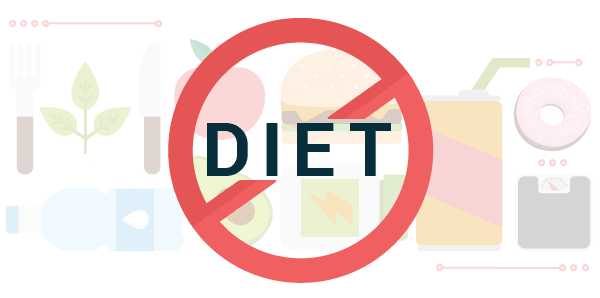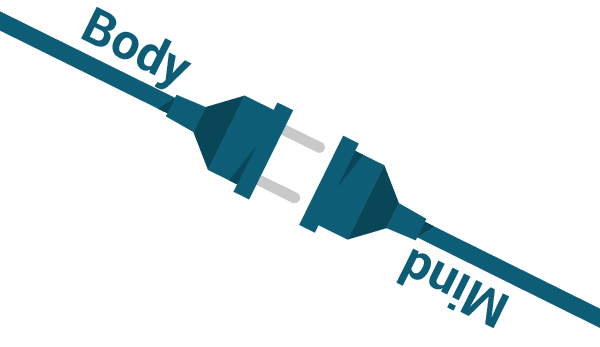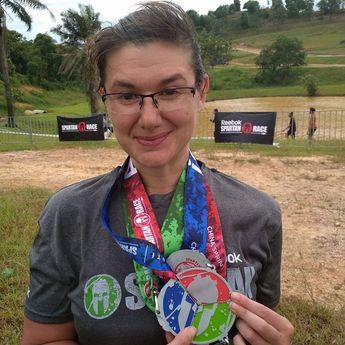Why You Shouldn't Diet
Do you want to:
- lose your quarantine weight gain
- prevent future weight gain;
- increase your sensitivity to hunger and satiety cues;
- reduce the chance of eating disorders;
- reduce your proneness to disease;
- improve your body image;
- reduce stress;
- feel more agent and in control;
- and improve your self-esteem.
Then for fuck’s sake stop dieting!
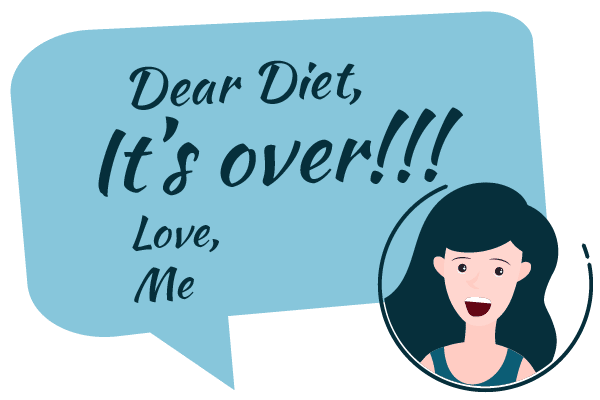
Why this article?
My name is Vania, I am 32 and I have been painfully aware that I am fat since I was 4. I started dieting at the ripe age of 10 and stopped 6 months ago.
I did a lot of crаsh dieting as a teenager. And after that 12 years of all types of low carbing. Including keto, combining it with calorie counting and fasting.
When I got married 3 years ago, the pressure to prepare for pregnancy, and become my healthiest self rose significantly. I was determined to solve this once and for all. I am smart after all, this shouldn’t be that hard.
So, I read more than 120 books and countless scientific articles on dieting, nutrition, psychology, metabolism and so on. I also experimented a lot.
Nothing worked.
I felt that I couldn’t trust my body. That we were mortal enemies.
Then I started challenging my deeply ingrained beliefs.
I started doubting that eating should be as hard as I was making it. That it should require endless rules, deprivation, and willpower. And at this point, I came across intuitive eating principles and health at every size.
It has helped me immensely. I started listening to my body more. I let it find it’s comfort zone in terms of weight. Now I focus on my physical and mental health, not on restriction and appearance.
This article is me sharing what I have found, through learning and self-experimentation.
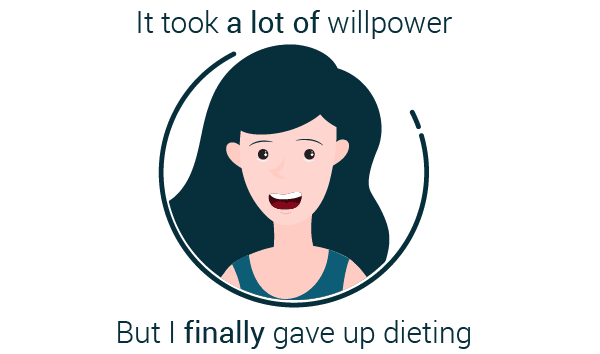
In this article:
- Definition of dieting
- Why do we diet?
- How we diet?
- What are these diets missing?
- Consequences
- Conclusion
Definition of dieting
Diets and dieting have become so mainstream that no one knows what they mean anymore.
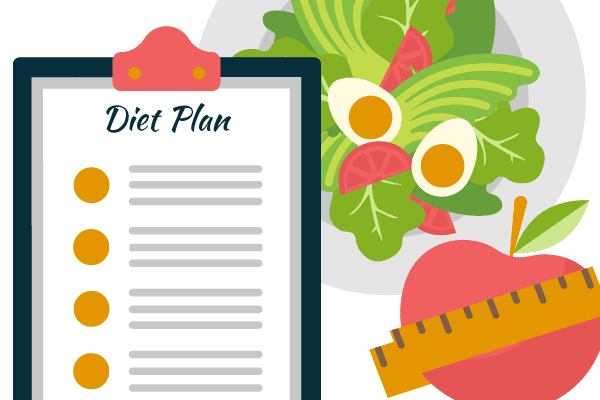
There are a lot of people, who realize they’ve gained some weight. Or they just decide to pay more attention to their health. So, they start to be a bit more aware of their eating patterns. They replace some of the junk food with fresh produce. They might start to cook more at home. Exercise a little bit more. They might start paying attention to their liquid intake and start drinking water instead of soda.
All these interventions are shown to be successful healthwise and sometimes lead to some weight loss. And these people are convinced that they have dieted successfully. And that with a little bit of effort you can go a long way. I won’t debate that.
What I am arguing is that this is not dieting. At least for 80% of the people. The definition of dieting I use is - following a structured eating plan with rules focused on what to eat, what not to eat, when to eat and how much to eat. And this is the practice that I find damaging and want to discourage in this article.
Why do we diet?
To look good? To feel good? To be healthy?
Looking good = Thin
We believe that we can’t possibly look good if we are not a size 2 or size 4 (or maybe 0 or 00). We put ourselves down and we’re put down by others.
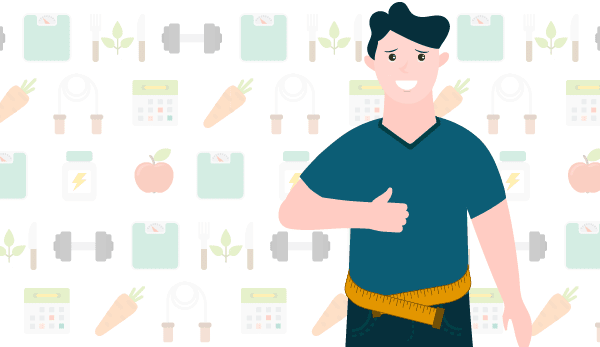
Striving for thinness and being dissatisfied with our bodies has become a favorite pastime. But this obsession is far from natural and normal. We judge everyone who doesn’t fit the prescribed frame for beauty and health. And we are harsher to the people who do worse than us.
Our weight as our height, IQs, and so many other things are normally distributed. But we think that 90% of people should have below average weight.
Also, our perceptions of beauty and what's normal are heavily influenced by media and airbrushed images.
The problem is that our minds get anchored by all these images. And the more we think we can’t be fooled by them, the more we are.
We don't realize that we’re comparing ourselves all the time. We think that movie stars, fitness models and people in advertising are what's "normal" and we aspire to be and look like them. The only thing we don’t take into account is that even those people don’t look like their pictures in real life. Even Cindy Crawford famously said that she wished she looked like Cindy Crawford. (Don’t believe me – check out “Damn the diets” by former fitness model Kayla Kotecki and “The perfection myth” by former fitness model Madelyn Moon)
A telling example of this is Ann Becker’s research in Fiji. Fiji was the place for this research because TV was introduced there in 1995. At this point, a group of girls was interviewed and they showed no signs of body dissatisfaction. They were happy and healthy. In the period 1995-1998, Ann Becker studied the effect of TV on these girls. At the end of those 3 years, more than 10% of the girls had purged in order to lose weight and most of them felt dissatisfied with their bodies. All of them wanted to be like the girls on TV.
We don’t see that if we like ourselves the way we are several industries will go bankrupt. A lot of money is depending on our insecurities.
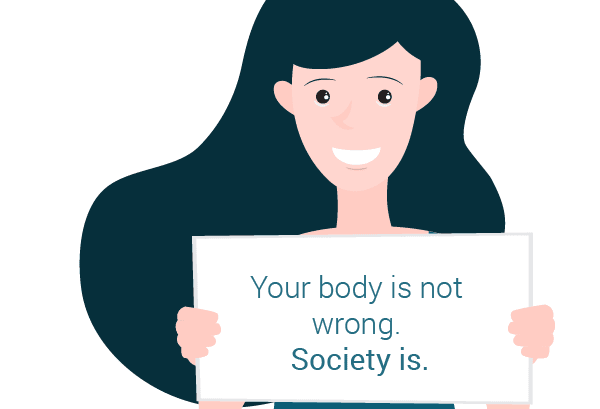
Looking Good = Feeling good
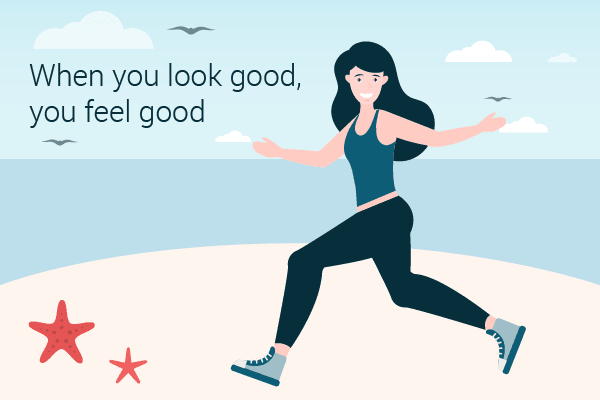
Feeling good is not at all the same as looking good. And this goes both ways.
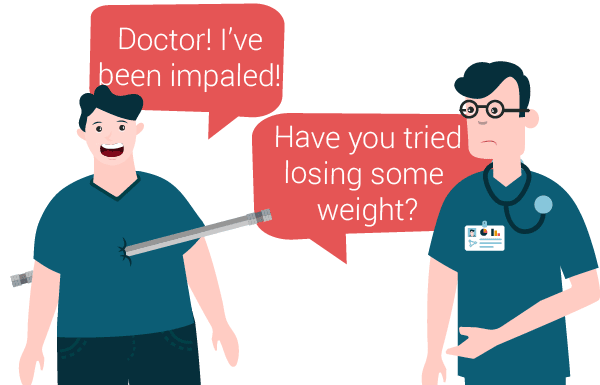
Usually, when we don’t look good we make ourselves miserable.
But have you noticed that when you get distracted and stop judging yourself in the mirror or pinching your belly, you can feel quite good? You can enjoy a great book. You can have fun with your friends. You can play with your kids. You can get into the flow at work and actually feel great about who you are and all the things you do well.
The problem is that we allow ourselves to forget that just by one glimpse at the mirror or one nasty comment. And these comments hurt, exactly because they echo our worst fears and beliefs about ourselves. That we’re not enough and we don’t measure up.
The problem is that being thin is not a silver bullet. A lot of thin people are dissatisfied with their bodies as well. They might not like the length of their legs, the shape of their toes or something else. Everyone has insecurities, and I mean everyone.
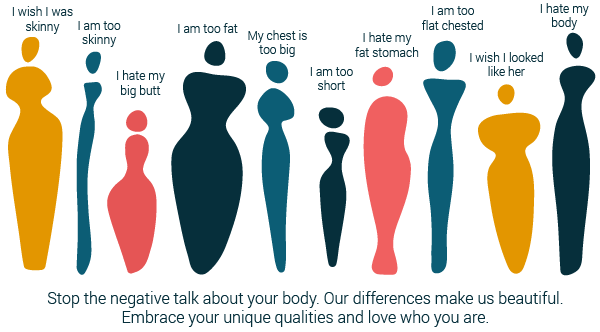
Also, being thin has become so valuable these days, that no matter if you’re naturally thin or had lost some weight to get there you’re ready to fight to the death to stay that way. There is a lot of suffering related to this. Some models even eat cotton balls and toilet paper, so they don’t feel hungry. They are so scared of getting fat, they would rather die.
Does this ring happiness to you?
But we fall easily into this trap and go on the next diet, to make us feel better. The problem is that it’s not really possible to deprive yourself to happiness.
Thin = Healthy
On so many occasions we use weight as a proxy for health. We use “scientific” numbers to classify people as overweight and obese. We openly criticize people for not taking care of themselves when they are fat, without knowing anything else about them. We’re judging the book by the cover.
Big time.
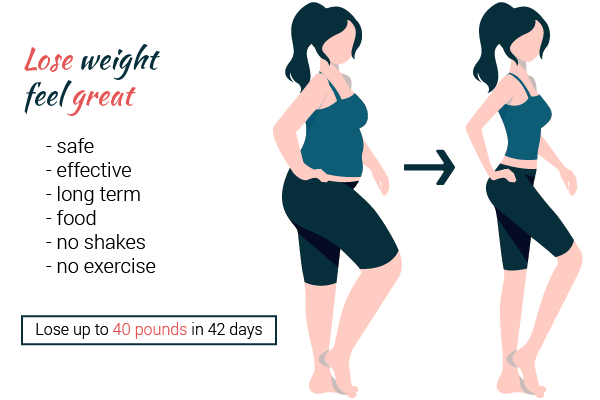
This claim that being fat is a health risk is so seductive and pervasive that it’s unavoidable.
But the truth is that BMI is not the best predictor of morbidity. In actuality smoking, low fitness, low income, loneliness, and high blood pressure are much better predictors of health outcomes than simply BMI.
You can be fat and sick, fat and healthy, thin and sick and thin and healthy.
Being fat doesn’t mean you’re sick.
Тhat you’re not taking care of yourself.
That you’re eating just junk food.
Or that you’re a couch potato.
You can take excellent care of yourself and not be thin. You can be thin and in fairly bad shape.
This prejudice goes two ways. With fat people being judged about their lack of healthful habits. And thin people’s healthful habits being grossly overrated.
The thinking goes something like this:
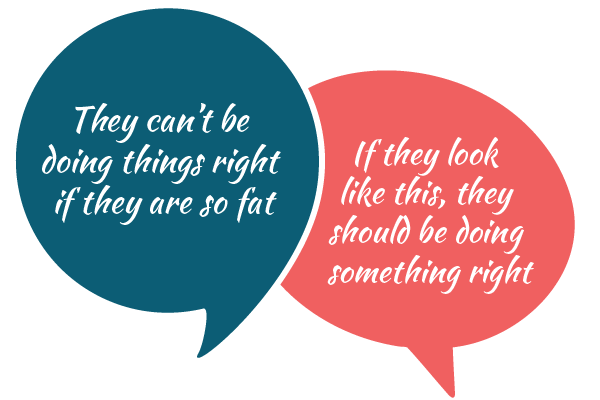
But this is so painfully untrue.
We all have predispositions in life. And the size and shape of our bodies express a lot of genetic and epigenetic factors.
The current theory suggests that we have a set-point weight. That there is a range of weight (usually 5-10 pounds) in which our bodies are in homeostasis. And our conscious attempts to lower our weight actually work to increase this set point.
How can we assess if being overweight (BMI >25) or obese (BMI >30) is a health risk? Let’s see what BMIs predict the greatest longevity.
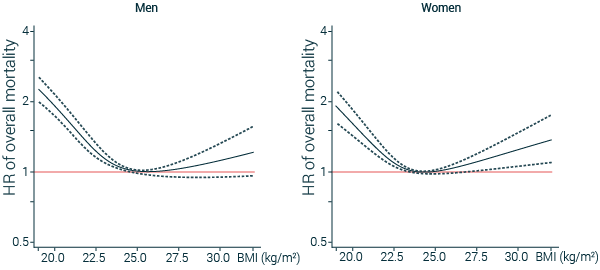
The researchers from this study have found that being slightly overweight is actually protective. It reduces mortality risk! And it's better than being underweight.
So, why are we so convinced that being overweight is dangerous?
There are strong correlations between some terminal diseases and being obese. The truth of the matter though, is that no one knows which is the cause and which is the effect. Does the disease cause the weight gain? Or the weight is actually a risk factor. And I mean it – no one really knows yet.
And for some people, the association between obesity and disease is enough to produce the desire to control their weight.
I can understand that impulse. I've followed it for a long time.
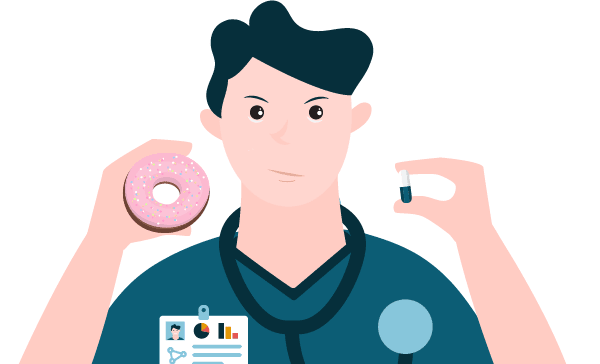
The problem is that we’re lead to believe that this is all up to us. It is clear-cut. And simple. We just need some willpower and persistence.
This is really really false.
And the very thing to do to improve our health – dieting, is a greater health risk than being overweight.
One more thing that I want to mention here. We like to use numbers in these kinds of pursuits. Being able to have an objective yardstick makes us confident that we’re doing things right.
What you can measure you can improve, right?
One tiny thing though – if the thing you’re measuring against is fairly arbitrary, I am not seeing it do much good.
Our beloved BMI is such an arbitrary measure. Yes, it shows a relation between our height and weight, which is better than using just weight – but it is totally made up. There is no significant correlation between BMI and health. For a lot of people, a BMI of 27 is a much healthier place than dieting to BMI of 24. Both mentally and physically.
And the cut between normal weight and overweight had shifted in 1998 from 27 to 25. Then and there the % of obese people changed overnight without anyone gaining an ounce.
And why the change?
You might think it’s based on research or something more tangible. I will have to disappoint you – it has been changed for the ease of use. Because round numbers like 25 and 30 are easier to use for physicians and lay people.
The same is the reason for the 2,000 calories per day recommendation. But I digress.
Fat = No willpower
Have you heard, that if you’re fat then you’re neglecting your health, you’re lazy and you lack willpower?
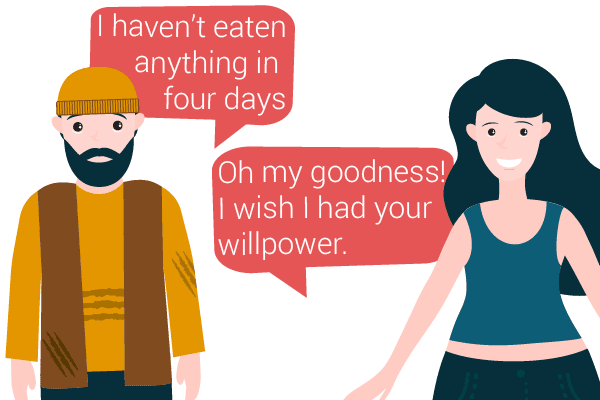
Even some Ph.D. programs are not accepting obese applicants. The reasoning is that if you don’t have what it takes to lose weight, you don’t have what it takes to finish your Ph.D. This is so wrong, that it’s hard to take seriously.
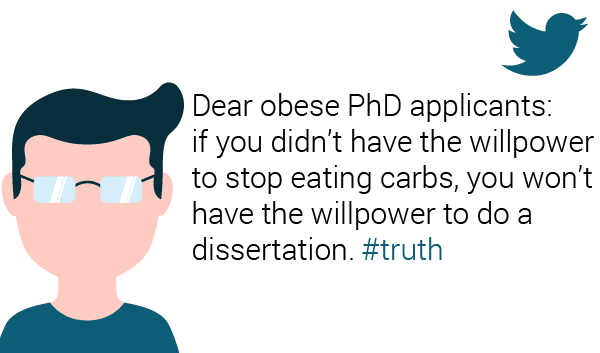
How do I know it’s wrong - I’ve been fat for all my life and I have a Ph.D. I actually aced it. And I did have the willpower not to eat carbs for a long long time. It just didn’t change my body.
So, we bully people with kind-hearted and well-intentioned comments like:
“Are you really going to eat that?”,
“It looks like you’ve had your fair share of food/cake/fries for this lifetime”
“Don’t you care about your health?”
And so on and so on.
You might think it’s tough love, but it’s just bullying.
You might think that this is the way to motivate positive change in people. Like you can shame someone into a better life. (If you think that by shaming people you help them, please urgently check out “Men, women, and worthiness”, “I thought it was just me” or any of Brené Brown’s books). Or at least her talks.
Your body shape is not a product of your character. There are a lot of factors involved, so please keep reading.
Other reasons to diet
There are a few other reasons to diet, which usually are combined with the 4 listed above. Diets can satisfy some core needs we might not realize:
- They give us structure. If our days are really hectic, we might need to put at least one part of our life in order.
- Need for control. Food is one of the things that we can easily control. At least for a while. This is the reason why a lot of people whose lives spin out of control stop eating.
- A need to feel like we’re taking care of ourselves. Lots of people equate diets to health.
- Proof of worthiness. Though it doesn’t work, because our worth doesn’t come from the scale.
- Proof of willpower. We feel that when we succeed at weight loss we'll prove that we have what it takes. But dieting has nothing to do with willpower, and when we fail… we feel weak.
- Safety. When we feel like we can’t trust ourselves, we lean on people to help us. We choose people who we believe have achieved what we want to achieve and trust their process. And this gives us a sense of safety. Though emulating others success is far less effective for weight loss than in other pursuits.
- We use them as a way to reinforce what we already think about the world and how it works. The predictability of the failure gives us a sense of familiarity and security.
How we diet?
Diets classification
In the following table, I have classified the 100 most popular diets by type. As you can see the newest diets focus mostly on the elimination of food groups.
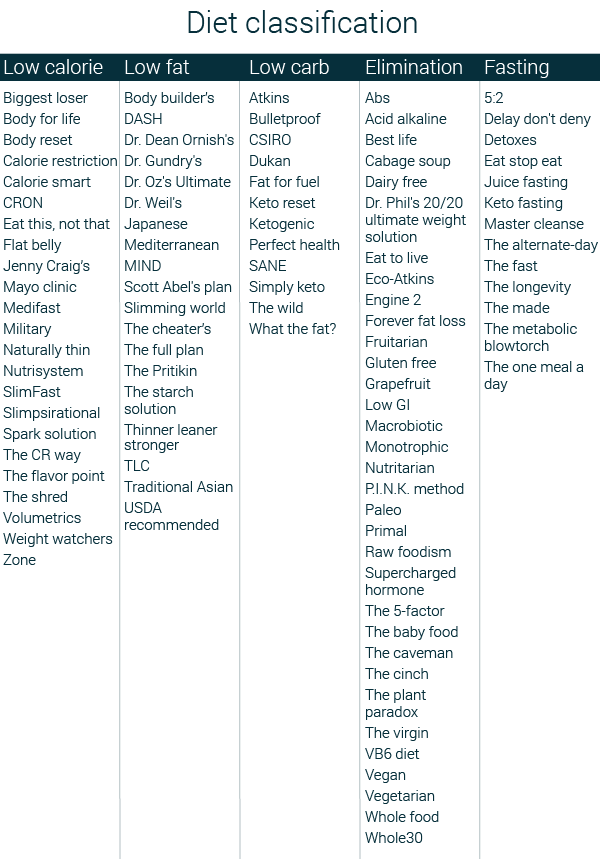
In the last year, the low calorie and the low-fat diets are starting to lose their appeal. And the popular diets are focusing mostly on eliminating food groups and fasting.
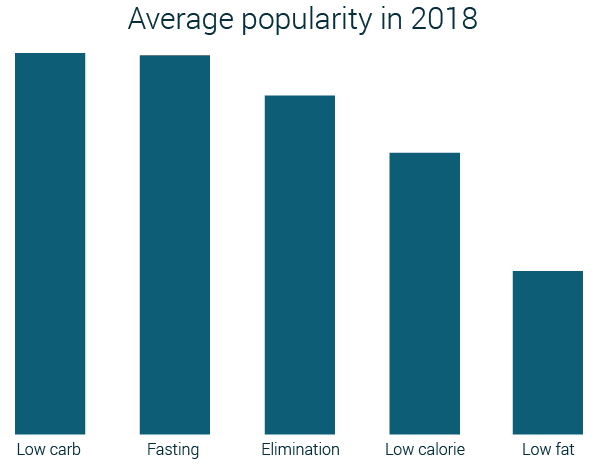
Even though the subject of diet is far from new, there are still a lot of bullshit diets that are very popular. To sort things out, I've created a bullshit-o-meter for the most popular fad diets. The criteria which determine how bullshity the diet is are - the probability of health problems, the limitation of fresh produce, how dogmatic the diet is, to what degree it leads to social isolation and the amount of general restriction involved.
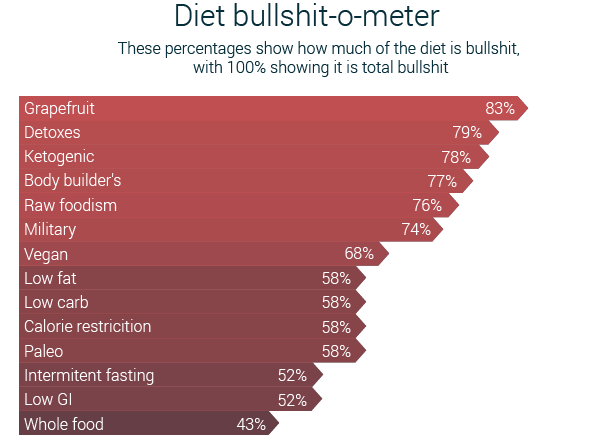
The more restrictive a diet is, the more social side effects it has and this makes it more bullshitty. The whole food diet, that we're accustomed to thinking is the best thing under the sun is also on this graph. The reason is that in the world we live in today it's not reasonable to expect that we can eat 100% whole foods. This would severely hinder our opportunities to have fun and socialize, which is far worse than a few less than perfect meals.
To help you see better how the healthfulness of these diets correlates with the amount of social isolation they entail, I have prepared the following graph.
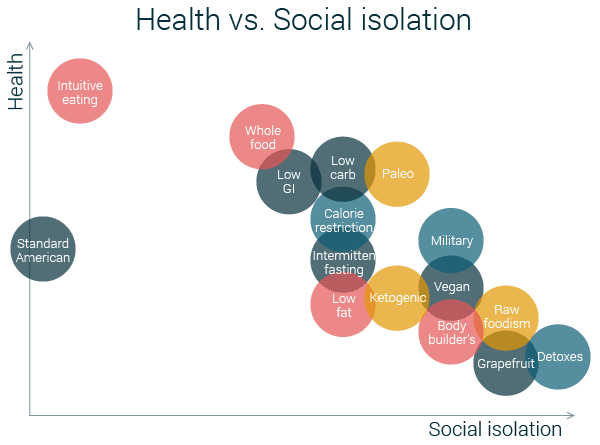
I have added the standard american diet and intuitive eating to this graph to make it easier to compare. Brefely, intuitive eating is the practice of eating when you're hungry, stopping when you're full and consulting with your self about what you want to eat. Not paying attention to food rules and fads telling you what to eat.
So, you think you should count calories?
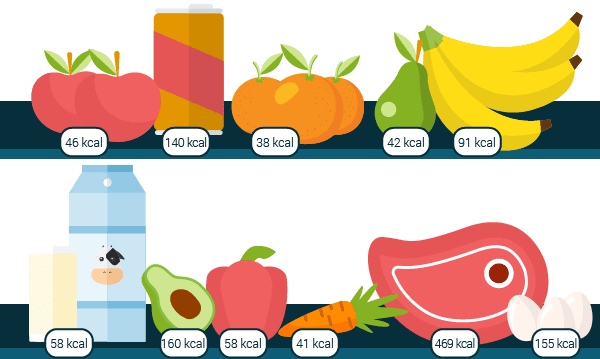
Counting calories is a fairly recent invention. It has started in the early 1900’s with the book “Eat your way to health” by Dr. Robert Hugh Rose as a “scientific system of weight control”. And followed up with “Diet and health, with key to calories” by Dr. Lulu Hunt Peters.
As every pervasive myth, the calorie hypothesis started as a plausible theory. Because of this, the scientists couldn’t assume that there could be flaws in it.
It was after all a scientific method. Electricity is a scientific invention. And most people don’t understand it but are happy to use it.
And they decided that they can’t keep this magical cure for themselves and deprive the public of it, so they went to print before rigorous testing.
The calorie hypothesis can be shown in this simple equation:
Calories In - Calories Out = Body Fat
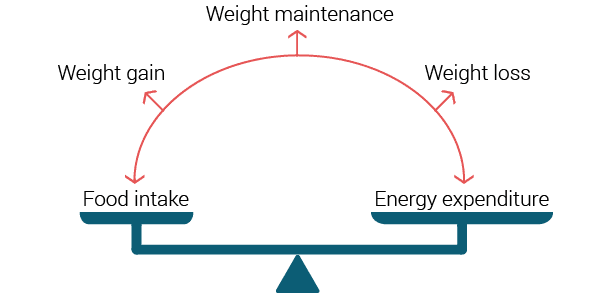
And now we’ll see the false assumptions this theory is based on:
Assumption 1: Ingested and expended calories are independent of each other.
Does this assumption sound plausible to you? To make a crude analogy, this is like saying that your income and your spending are independent of each other. And this false assumption is critical for the calorie theory. The prolonged decrease in ingested calories inevitably leads to a decrease in energy expenditure.
There are numerous studies showing that calorie restriction inevitably leads to decreased metabolic rate and energy expenditure. Let’s see some of them:
1) 1919 in the Carnegie Institute of Washington. In short, the volunteers consumed roughly 30% lower calorie intake than usual. The result? 30% decrease in total energy expenditure.
2) The most famous one is the Minnesota starvation experiment published in 1950. After the war, this experiment was an attempt to understand both calorie reduction and recovery phases of starvation.
The participants were 36 healthy normal men.
For the first 3 months, the men were given their standard diet of average 3200 calories per day.
Over the next 6 months, their allotment was reduced to 1570 calories per day. Though this daily intake was constantly adjusted so the participants would reach their target weight loss of 24% (compared to baseline), averaging loss of 2.5 pounds per week. Some of the men eventually received less than 1000 calories per day to maintain this rate of weight loss.
The expected daily calorie expenditure of those men was 3009 calories. But it wasn’t. By the end of the experiment, the resting metabolic rate of the men had dropped by 40%. And that wasn't all.
3) One of the longest and most elaborate studies on diet ever done – The women’s health initiative dietary modification trial. It included almost 50,000 post-menopausal women and tracked them for 7.5 years. One-third of which were educated about healthy living – how to reduce their calorie intake, to reduce their fat intake and to eat more fruit and veggies. Also, how to include more exercise in their routine. The control group continued their lives normally.
The results:
The instructed group reduces their calorie intake by 342 calories per day on average.
Reduced their fat consumption by 10%.
Exercised 14% more.
Success all around.
But what about weight loss?
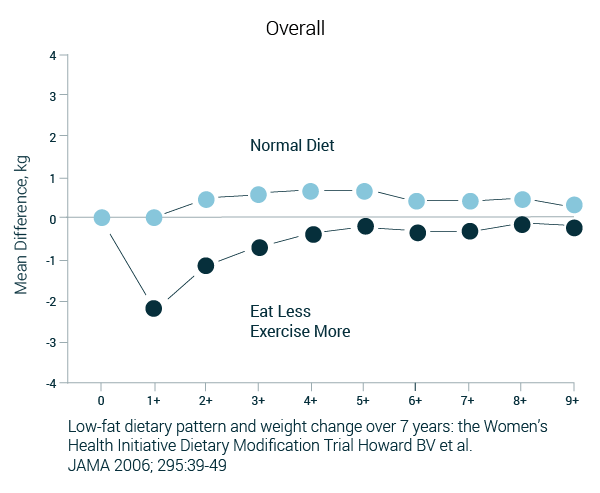
For the whole period, the women in the experimental group lost the impressive 0.88 pounds. And their waist-to-hip ratio actually increased from 0.82 to 0.83. Which means that these women had worse body composition, with more abdominal fat after this intervention.
Assumption 2: Basal metabolic rate is stable
When we talk about energy expenditure, we usually think of exercise. But measuring the total body expenditure is really complicated. And because we don’t like complicated things we assume that energy expenditure is constant, apart from exercise. But our total energy expenditure depends on all the following variables:
- Our basal metabolic rate;
- The thermogenic effect of the food we eat;
- Non-exercise activity thermogenesis;
- Excess post-exercise oxygen consumption;
- And finally, exercise.
If we eat 200 more calories today, nothing prevents the body from burning them for extra heat. They might get excreted as stool, or something else. What determines the output of our body? How is the food we ingest used? The possibilities are:
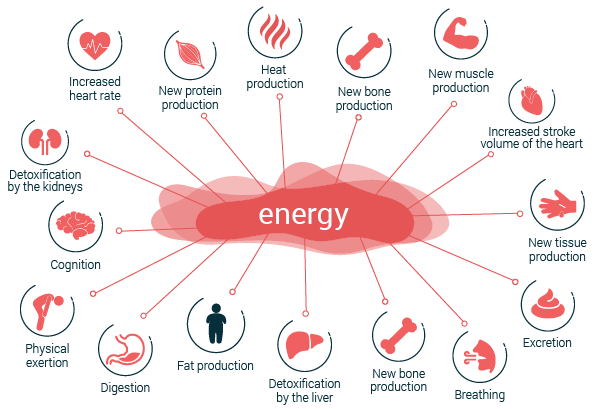
We don’t mind any of those, except the fat production.
There is an almost infinite number of ways how our bodies utilize energy. Or cut back on energy expenditure.
What happened to the men in the Minnesota experiment was the following. In addition to the 40% decreased metabolic rate, the men were constantly cold. They asked for extra blankets in July. Their body temperature had fallen to 95.8 degrees F. Their strength decreased by 21%. Heart rate slowed down considerably – from 55 to 35 beats per minute. Heart stroke decreased by 20%. Physical endurance dropped by half. The men were tired and dizzy. They were losing hair and their nails were brittle. And these are just the physiological effects.
So, our metabolic rate is far from stable. With prolonged calorie restriction the body starts to shut down, in order to preserve itself and survive.
Assumption 3. We have conscious control of how much we eat.
Our assumption is that because we are the ones that put the food into our mouths we have absolute control over what we eat. Our hunger cues, satiety, and preferences have little to do with our needs, we reason. The problem is that we can’t outthink our biology. There are numerous overlapping hormonal systems that influence the decision about when to eat, what to eat and when to stop.
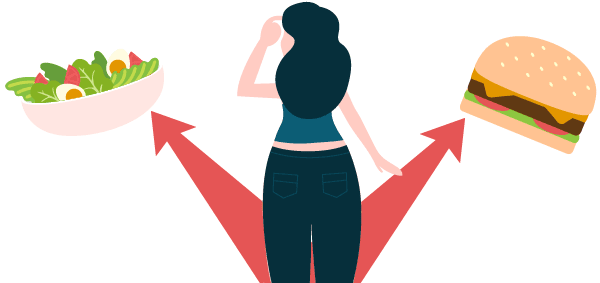
Our bodies have an intricate system guiding us to eat or not. Our body fat regulation is not under conscious control, but under automatic control, as is our breathing. We can control our breath for a while, but we don’t need to do it all the time, and if we don’t our bodies take care of this for us.
The defining characteristic of our bodies is homeostasis or adaptation to change. Our bodies deal with the ever-changing environment. And make the necessary adjustments to account for that.
There are two major adaptations to caloric reduction. The first is the proportional reduction in energy expenditure. The second is the hormonal signals that increase hunger and decrease satiety.
This has been shown in a great study of hormonal adaptation. The subjects were given a 500 calorie per day diet. Which produced an average weight loss of almost 30 pounds. A low-glycemic, low-fat diet was prescribed for weight maintenance as well as exercise.
Various hormonal levels were monitored – ghrelin (the hunger hormone) was one of them. Also, the satiety producing hormones – peptide YY, amylin, and cholecystokinin.
Before the end of the study, almost half the weight was regained, despite the best efforts of the participants. And their ghrelin levels significantly rose. So, the participants were feeling hungrier and hungrier right to the end of the study. In addition, the levels of the satiety hormones had also dropped significantly, so the participants were unable to feel full.
You probably know this, when you diet you tend to feel hungrier and it’s harder to feel satisfaction and satiation when you eat. And this is not in your head, nor is it a loss of willpower.
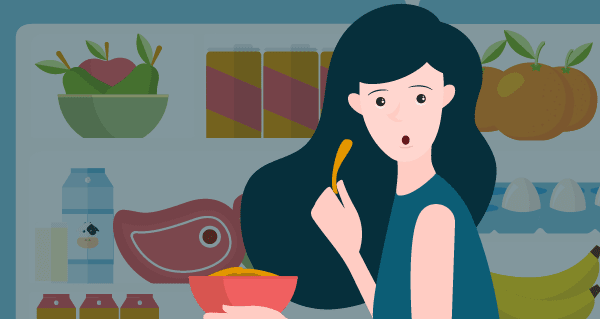
The Minnesota experiment has a lot to offer as insight here too. It produced the first documented effect of “semi-starvation neurosis”. The men dreamed about food. They obsessed about food. Interest in all else diminished. They ate slowly and chewed each bite endlessly to savor the taste. Also, they collected recipes, utensils, and everything related to food.
4 of the men in the Minnesota experiment became chefs after it was over. Without any prior interest in cooking.
So, weight loss results in decreased metabolism and satiety and increased hunger. Go figure, why we usually regain the lost weight. And this is not a moral failing of any kind.
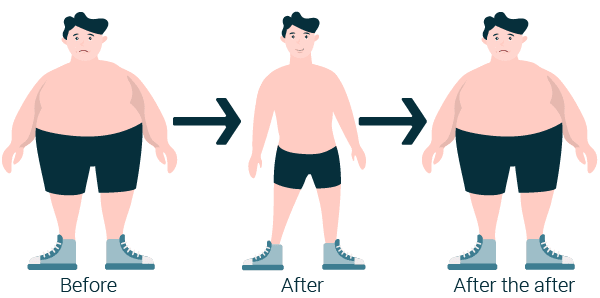
Assumption 4. Fat stores are theoretically endless
Every single system in our body is regulated. We don’t blame ourselves that we’re not tall enough or that we are too tall. We know that our height is hormonally regulated. Blood sugar is regulated primarily by insulin. Our body temperature is regulated by our thyroid hormones and so on.
But we believe that we can grow endlessly fat.
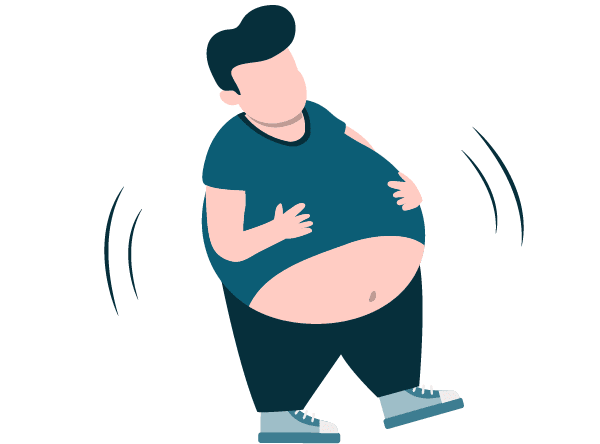
The pathways by which we gain weight are numerous and not completely known yet. New hormones regulating our weight are discovered all the time. Some of them are leptin, adiponectin, hormone-sensitive lipase, lipoprotein lipase, and adipose triglyceride lipase.
So, let’s take a look at some overfeeding experiments. Dr. Ethan Sims conducted such experiments with convicts at Vermont state prison. Attendants were provided 4,000 calories per day, and they were eaten. Physical activity was strictly controlled, to be sure that the subjects were not engaging in over-exercising and burning them off.
The prisoners' weight initially rose, but then stabilized. At first, the men were happy to eat more, but with time it became more and more difficult. Some of them even dropped out of the study.
Over six months, the remaining participants gained 20 to 25% of their initial body weight. Which was much much less than the calorie calculations predicted. And the actual weight gained varied widely from person to person.
The key to this variation was their metabolism. All the participants' metabolic rates increased in response to the higher energy intake, but there were huge individual differences. The interesting part is that after the experiment was over the weight of the most participants effortlessly returned to normal.
Overeating didn’t produce the dreaded lasting weight gain.
Assumption 5. A calorie is a calorie
This is a very dangerous assumption. This implies that the only factor in weight regulation is the number of calories we ingest. But does butter have the same metabolic response as honey? I am not saying that one is good and one is bad … but simply that they are different. And that the metabolic response they elicit is also very different.
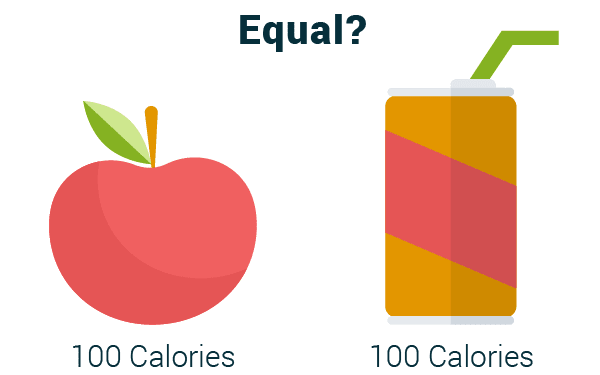
This section won’t be complete without mentioning Sam Feltham’s self-experiment and the Twinkie experiment.
So Sam Feltham ate 21 days of high-fat, high calorie (around 6,000 calories per day) diet and suffered no ill effects. He even increased his muscle mass and lost fat. When eating the same amount of calories on a high-carb diet - he gained a lot of fat.
I am using this example just to illustrate that calories are not the same. I am not saying that his experiment proves anything. Or the superiority of one diet over another. The problem with these experiments is that they are based just on one person, and are usually short in duration. And the person making them is heavily biased.
I am not sure how you feel, but for me, 21 days is much shorter than a lifetime. Also, not all people will have the same response. I am very certain that if a Japanese person repeats the experiment he’ll have the opposite results. And 21 days is not a long enough time to exclude the placebo effects from the results. So, it’s a bit foolish to base lifestyle decisions on experiments like this.
What the experiment shows is that not all calories are equal, and nothing more. And that your preferences and life views can tilt the scales in the direction you feel is right.
So, calories are not equal. Foods containing the same amount of calories are not the same. And the same food doesn't have the same impact on different people.
It’s similar with the Twinkies. Mark Haub ate mostly twinkies for 10 weeks, controlling his calorie intake. What he thinks he has proven is that pure calorie counting is the way to control your weight.
Just a second here.
Before you’re convinced, let’s take some things into account.
For initial weight loss, almost anything works. His diet lasted 10 weeks. This is not a long time. Not enough for your compensatory mechanisms to kick in full gear. And usually, when you’re trying to prove a point publicly, you’d rather die than be wrong. So your tolerance for discomfort skyrockets.
We also don’t know if he had dieted before and how frequently, because this is a huge factor in your initial success. Every chronic dieter will tell you that the first diet is how you get hooked. It’s so easy the first time. But it doesn’t last. And it’s not that easy next time.
Another thing is that he’s white and male. Which are 2 factors that make it easier for him to have initial weight-loss. As you know, it’s much easier and faster for men to lose weight all things being equal. Especially initially. Because body fat is less essential for men than for women. So, the compensatory mechanisms kick in later.
Also, white men on average lose more weight than for African Americans and Hispanics. And have less to lose in general.
Congratulations on your white penis Mark, but your experiment isn’t very representative.
We also don’t know what happened after he finished his experiment. Because the success of an intervention is measured by the long-term results. Not just the immediate one.
SO, are calories all that matter?
My answer is a resounding NO.
Assumption 6. We can calculate our calorie intake accurately
Food labels are everywhere. Authoritatively stating calories, proteins, fats, carbs and what not. But you might not be aware that the FDA allows up to 20% error on those labels. And that also those errors are hard to find and fix.
Nonetheless, we download our calorie counters and we believe that it’s super easy to calculate our intake.
It’s surely easier than to guess our expenditure, but it’s still impossible and futile.
The most precise method of measuring the calorie content of food is by burning. This method is expensive, so it's not widely used. Most labels are produced following the formula that 1g of carb is 4 kcal, 1 gram of protein is 4 kcal, 1 gram of fat is 9 kcal and 1 gram of alcohol is 7 kcal. This, of course, is a gross estimation because foods are fundamentally different. For example, gluten is a protein and it has 5 calories per gram, not 4 and so on. And even the expensive method is not accurate because we don’t burn the food, we digest it.
Also, there are no two apples that have the same calorie content. The ones from the top of the tree are up to 25% more calorie dense. Also, ripeness makes a huge difference. The same with meat, dairy, and other produce. Usually, the more standardized the food is and the more accurate the label, the more processed it is. Which is far from optimal.
Cooking also, makes the food more energy dense and more digestible. We can't know how much energy has the food absorbed in terms of heat. What chemical reactions have occurred. What has become more digestible and what has been become indigestible. So, the energy content of the cooked food is impossible to assess.
Also, what we ingest and what we absorb are two different things. Our specific enzymes and microbiota can make us absorb up to 50% more than the calories we ingest … or 50% less. It also very much depends on the types of foods we eat.
So, downloading a calorie counting app is not the solution.
All these assumptions are false and the calorie-counting paradigm has been a century-long dead-end.
How about low fat then?
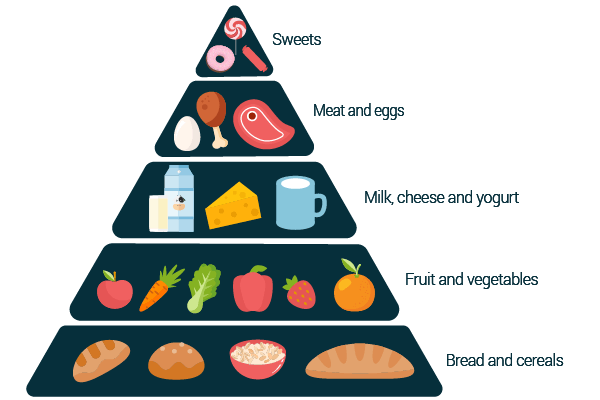
The story of how low-fat diets came about is very popular. But it’s so absurd, that it’s worth repeating because this type of thinking and action is the basis for lots of modern diets and fads.
And this is to prove that having a good track record is not a 100% guarantee. Ancel Keys conducted the excellent research on starvation. And this was a proper and meaningful experiment. Which gives us a lot of insight into human physiology and psychology.
But what he did next, wasn’t so great.
His next research was the 7 Countries study.
After World War II Keys noticed, that even though Americans and Englishmen have better access to food, they are not healthier than the people in the Mediterranean region. And especially that Americans had more heart attacks.
He thought that the reason is the low-fat nature of the Mediterranean diet. And its focus on polyunsaturated fat i.e olive oil. So he gathered data about the eating habits and health outcomes of the people from 22 countries, so he could check his hypothesis. The problem is that the statistics in his research were flawed. He started with 22 countries and left just 7 - Uganda, South Africa, Sardinia, Bologna, Ilomantsi, Finland and Japanese men living in Hawaii and in Japan. Because the others were screwing up his results.
And another major flaw is the assumption that when you make people eat the traditional diet of other regions, they’ll have the same outcomes.
Do you think that if Greek people eat like the French, they’ll feel the same way and have the same health outcome?
Doubtful. Very doubtful.
And this is the bases of the Dietary Guideline for Americans.
This is so common, that it’s not even entertaining. Someone thinking they found the Holy Grail of health. And being so convinced that they are right, that even their own results can’t convince them otherwise.
Their new approach is revolutionary! The last piece of the puzzle! You don’t need to wait for the appropriate medical research to be conducted (which sometimes doesn’t even happen).
Act now! You have a responsibility to your health and loved ones! Don’t think too much! Just do it!

This is how we make life decisions based on strong personalities, politics and bad science. And we risk the very thing we were trying to protect.
There are multiple problems connected to the low-fat dieting approach. Let’s briefly list them here:
Problem 1. Most of the essential vitamins we get from our food are fat soluble. When we don’t eat enough fat, we can absorb much fewer nutrients and we’re prone to nutritional deficiencies.
Problem 2. Our brains are 60% fat, our myelin is 100% fat. When we don't eat enough of it, our brain doesn't have the building blocks to build strong connections. So, we might impair our brain function.
Problem 3. Hormone imbalances. This is because most of our hormones are fat-based. So for proper function, we need the proper building blocks.
Problem 4. The illusion of cholesterol control. The issue is that cholesterol is mainly made by our bodies and our cholesterol levels are not so dependent on the food we eat. When we eat more cholesterol-rich food our bodies make less, if we eat less cholesterol-rich foods, our bodies make more. Also, cholesterol is not the best indicator of heart disease. It's now recognized that inflammation is the bigger culprit.
Problem 5. A lot of natural foods are high in fat - meat, dairy, nuts, olives, avocados and so much more. To make these foods low fat they go thrоugh heavy processing. And usually, to make the result palatable, they are supplemented with lots of sugar. And refined processed food is a much greater risk factor than real fatty food.
Problem 6. Fat makes food tasty. When cooking, fat is the ingredient that carries the aroma compounds. It also carries a lot of the taste. Fat is responsible for the browning reactions when baking and it is the reason we get the crispy chicken skin. Without fat, food tastes bland. And it’s much harder to feel full, satiated and satisfied.
When you combine low-fat with calorie counting, which you usually do, you get in addition to all the problems listed above.
Or maybe low carb?
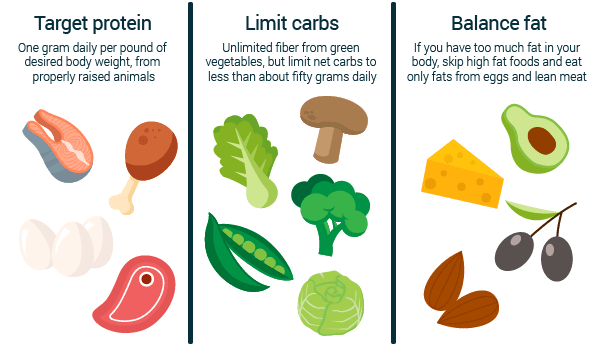
The idea behind low-carb diets is incomplete and misinformed.
And the solution it sells you comes more from marketing, not science or reality.
There are three main factors in the low-carb craze.
First, is the idea that “starchy and floury substances” are among the leading causes of obesity. This is maybe the first dietary advice ever published. It dates from 1825 from the textbook “Physiology of taste”.
Second, “the extremely high-fat diet” was a medical intervention prescribed to treat brain disorders - especially epilepsy. And it was shown to produce some weight-loss.
Third, by the 70's the low-fat paradigm was proving ineffective. There was a need for a new dietary villain.
All this, combined with and the fear of fat, as a cause for heart disease, lead to the low-carbing as we know it.
It is a mutant of combining two opposing ideas - "high fat" and at the same time "low fat". Because selling the “high-fat” approach was impossible at the time, it was rebranded as low-carb. And this is how low-carb, low-fat, high-protein diets came to be.
Protein was sold as some kind of a magic macronutrient. And still has its halo of virtue.
But when you do this kind of high-protein low-carb diet you pay a high metabolic price. Both fats and carbs are protein sparing nutrients. So, either carbs, fats or a combination of the two should be sufficient in the diet to allow the protein to be used to build and rebuild tissue. Which is its main function
And high protein usually means more harm than good. It messes up your nitrogen balance and the levels of uric acid in your body. It forces your body to produce sugar from protein via gluconeogenesis. Which is cool, but far from optimal for you.
The more modern reasoning about low-carb diets is that they keep your insulin in check. What they forget to tell you is that protein ingestion also produces insulin spikes. So controlling your insulin by changing potatoes for whey won’t really work.
And while we’re still on the subject. Let’s hear what the low-carb guru Dr. Atkins thinks of dieting (including his own diet):
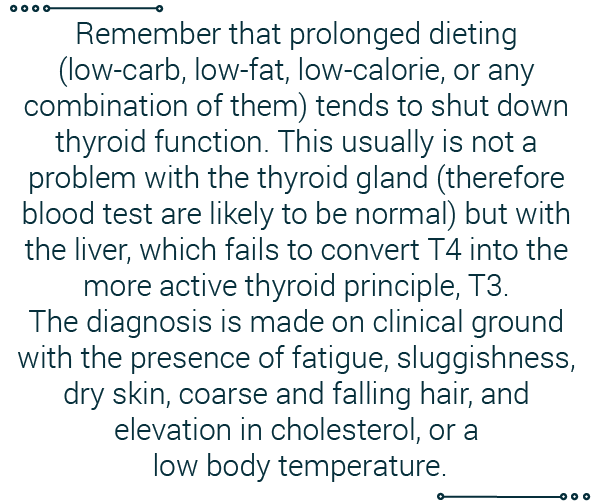
Sound familiar?
So, Paleo then?
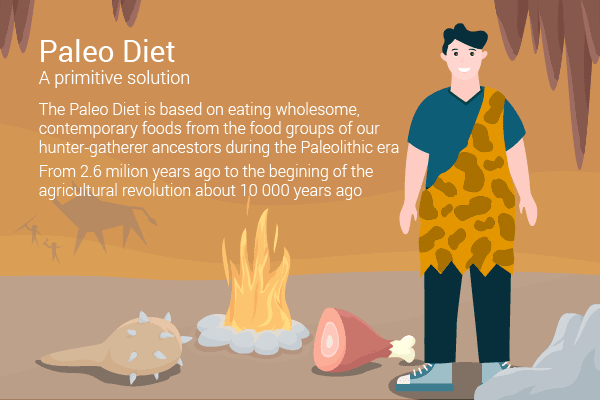
I am sure you know what Paleo is, but for aligning the definitions and to open myself to criticism that I don’t know what it is, I’ll write a brief description. Paleo is based on the fact that our biology had stopped evolving around 10,000 years ago, so we’re not equipped to eat the modern foods - like dairy, grains, legumes, potatoes, modern processed food.
One of the problems with Paleo is that it has no basis in archaeological reality.
Let’s look at some facts:
- There is plenty of evidence that even before the agricultural revolution, humans ate seeds and grains. And that humans learned to process and refine foods well before agriculture.
- Hominids living 2-3 million years ago ate more grasses and grain than did fruits and leaves;
- The foods that Paleolithic people ate no longer exist today. The fruits and vegetables we know and eat are a product of farming, not evolution.
So, we can’t eat like our ancestors, no matter how much we want to.
Also, no one knows if our ancestors would eat as they did if they had other choices. It was most definitely not a very pleasurable experience. Which is most likely the reason why they started experimenting with cooking, processing, and refining.
So, we see how fads are represented as “based on science”. Paleo diets are just a variant of the low-carb paradigm. Just changing the packaging of the product to boost sales.
And there isn’t any science to back this diet up.
It’s really important to understand that our ability to adapt to different diets, foods, and environments has allowed our species to thrive and spread across the globe. Also, what is missing in the Paleo reasoning is a basic understanding of digestion.
Our digestion is not just a product of our human evolution. What we extract from the food we eat is heavily dependent on our microbiota. And it’s estimated that our human superorganism has more than 90% microbial DNA. The good news about this is that the life-span of our gut microbes is much shorter than our own. So in one human lifetime, we house thousands of generations of microbes - which allows them to evolve and adapt to our diet.
The food we eat also provokes changes in our microbiome. So, the idea that we haven’t evolved to digest grains, legumes, dairy and what not is a bit far-fetched.
Keto?
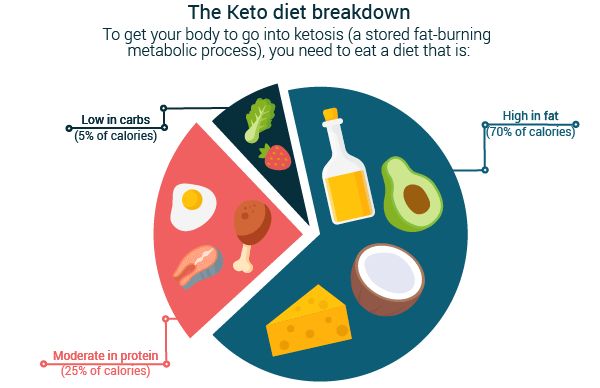
Keto is very hip… …. right now.
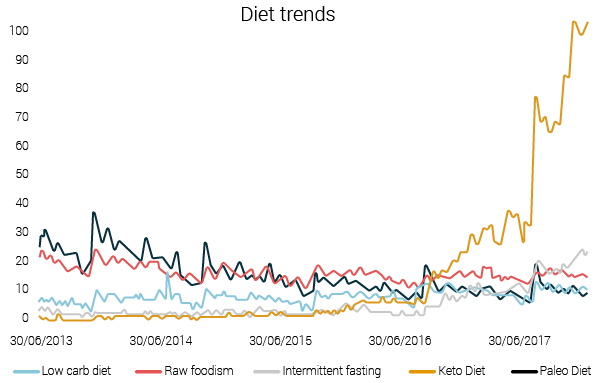
It has even been called “nature’s liposuction”.
What a load of bullshit.
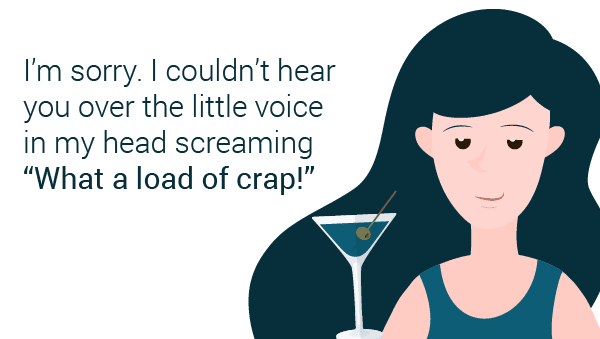
What keto proponents tell you is that if you eat <50 g of carbs a day, 15-20% protein, and south of 70% fat a day, all your troubles are over. You’ll lose weight, you’ll feel great and all your problems go away.
Now, let’s start addressing the issues one by one.
First, it’s true that fat is the only macronutrient that doesn’t provoke insulin release. But, as fat is digested it provokes adrenalin release. This is the reason why some people have more energy and they feel kinda excited - they arere high on their own adrenaline. This might not sound too bad, but after a while the adrenals get overloaded and they can even develop adrenal fatigue.
The point of ketogenic diets is to get you into nutritional ketosis. And nutritional ketosis is a state very close to starvation. The reasoning goes that this is how you trick your body to use fat for fuel. The problem is that ketosis is not our primary condition. It’s a safety measure. It’s not meant to be long-term. When you’re starving your body, it uses its own fat as fuel, this yanks up the adrenalin, so you’re pumped and you have the energy to go and find food. The goal is to find food, not to stay in ketosis indefinitely. And some people get overloaded by it and after a few weeks crash.
Starvation is a stressful experience. Even if it’s simulated. And your body being in chronic stress is much worse than the 20 or even 50 extra pounds.
On the other hand, a lot of people get lethargic and weak from the diet. They never get over the keto flu, that is supposed to last about a week. And not because they haven’t done the adaptation process right. The digestion of that amount of fat requires quite the gallbladder and hefty bile production. Not everyone has those and this is the reason there are a lot of people who don’t handle the diet well, even if they like the food.
Also, your brain can use ketones for fuel, but just up to 75%. For the other 25%, it needs glucose. And 50g of total carbs usually don’t cut it. So, the missing glucose is produced via gluconeogenesis - either from the protein in your food or by digesting your own muscle. The problem is that if you overdo the protein, it will take you out of ketosis - because protein stimulates insulin release.
So, the boundaries you need to navigate are very very narrow. And if you have kids, a job and a life in general.. this can drive you crazy.
And now it’s time to address the micronutrient deficiencies. Yes, without fat a lot of vitamins are unabsorbable, but guess what, without the vitamins in the food, all the fat in the world won’t help.
And the amount of micronutrients you get when eating keto is tiny and not varied. Usually, keto gurus advise you to eat lots of greens as they have the biggest bang for your carb buck. But there are other micronutrients that you need. So it will be better for you if you eat more colorful and not just green. But if you eat the other colors, you usually get small amounts of the food, so most people prefer the most voluminous options and stick to the greens.
To convince you that a keto diet will give you all you need they site studies on the Inuit, who eat their traditional diet of fatty meat with little to no plants, without suffering any ill consequences. What they’re failing to address is that you’re not living in arctic conditions and that this is not your traditional diet. That there aren't generations of your ancestors accustomed to eating this way. That you’re accustomed to it and that your environment doesn't support it.
For this reason, keto prescribers also advise you to take a mile-long list of vitamins and fiber. The problem is that there is a lot of research now, showing that synthetic vitamins can’t replace the natural ones. And sometimes taking vitamin supplements is worse than not taking one. Because they negatively impact the digestion of the real thing.
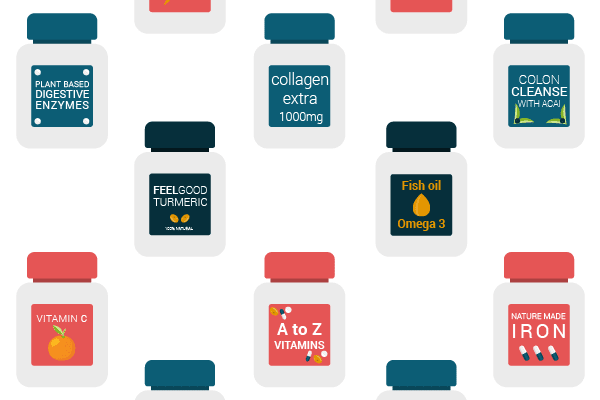
With fiber is similar. As it’s not optimal to eat the food without the fiber - heavily processed foods. It’s not optimal to take the fiber without the food. It can cause serious indigestion and elimination problems and sometimes IBS.
And there are more than physiological problems with keto. One of them is that the food you are eating doesn’t provide a lot of variety in taste, texture, and pleasure (especially if you’re avoiding all fruit and dairy). Some people think this is a good thing. After a while, you naturally get less hungry, because you get tired of the same old same old (habituation). But usually, this is the time when you start getting intense cravings. And this could go a number of ways.
You can start hiding from food adverts, outing with friends and so on, because the temptation is too strong. You can start hefty use of sweeteners and prepare homemade ketogenic desserts. Or you can just fall off the wagon and blame yourself intensely.
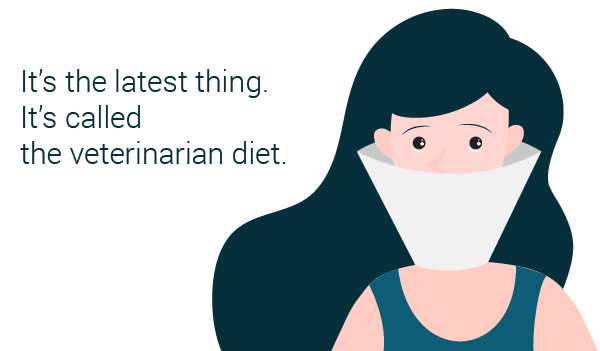
Ketogenic diets really do have some clinical applications and could be a tool to battle with illness. But only if they are done short-term, with supervision and in response to a condition. Not as a lifestyle.
Low Glycemic Index
As you probably know the glycemic index is a measure of how fast your blood sugar levels rise after ingesting certain carbohydrate. And the assumption here is that the faster your blood sugar rises, the more insulin you’ll release. And this is bad.
The low-glycemic index idea has some overlap with the low-carb idea. The idea is that by controlling the types of carbs you ingest you’ll control your blood sugar and your insulin.
3 major problems here:
- Using blood sugar as a proxy for insulin is wildly inaccurate. Different people have different amounts of insulin release for the same amount of blood sugar.
- Lots of foods produce insulin spikes - not just carbs. Proteins, which don't contain any sugar, also spike insulin in varying degrees.
- The glycemic indexes are based on the average of the responses of just 5 to 10 people.
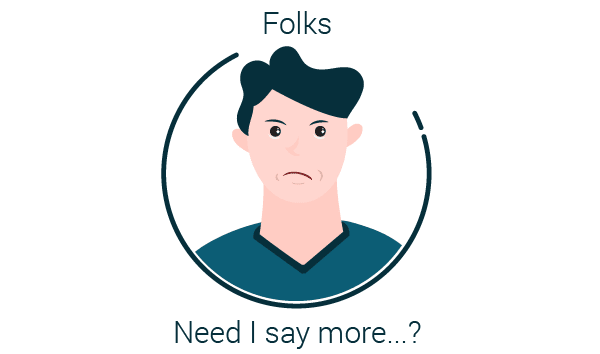
Maybe I do. I want to pay more attention to my last argument here. It’s really important to understand here that people are wildly different. In the research cited, there is no mention even of what kind of people are tested. Are they just caucasian (which is often the case in medical research)? Are they just men (which is also often the case in medical research, especially from the 80’s)? What are the ages of the subjects, their occupations, what are the individual variations and so on? We’ll focus more on that type of problems later in the article.
What about Vegan?
I want to begin with a clarification. I am not criticizing you for being vegan for ethical reasons. There is a problem only if you are not addressing the risks adequately.
Most vegans are at risk of not consuming adequate amounts of fat, especially omega-3, which can have the same risks as low-fat dieting.
Also, the notion that eating meat is unnatural and bad is simply false.
However, you look at it.
Humans have been eating meat long before they have been eating grains. And though it is healthy for us to make the bulk of our diets plant-based, it’s not the only thing that is good for us.
Humans are omnivores for a good reason. We can sustain ourselves on a lot and varied food sources. We have survived as a species exactly for this reason.
And comparing ourselves to people in India is a bit misguided (though Hindus are mostly vegetarian, not vegan). What is best for us has been determined by climate, availability and tradition for 99% of human history. And I don’t think it is different now.
Another problem with gurus selling veganism as a health intervention is that the research they are citing is rigged. One of the biggest and most famous pro veganism studies “The China Study” is proven to be flawed. Not just because the researchers equate casein protein to animal protein in general. Not just because they study the effects of saturated animal fat on rabbits, which are herbivores, so the conclusions do not apply. But because of gross statistical negligence and misconduct. As proven by Denise Minger.
The problem with most studies that are pro-veganism are rigged. A lot of them don’t go past rat models. Which are useful, but not proof for what is best for humans. Lot’s of them are short-term. Also, they usually use highly processed meat such as hot dogs for a substitute of all animal protein. So, I don’t think there is anything definitive on the subject.
Also, these studies don’t account for the enjoyment of the food, and feelings of deprivation. If you love your food. Never feel deprived. And don’t go on a guilt trip for wanting a chicken wing … you’re in the clear.
And another thing is that taking in all necessary essential nutrients is far easier when we eat as varied as possible. Including animal products. Because the enzymes, fats and other nutrients from them make it that much easier for our bodies to absorb all the plant goodies that come from our salads.
Also, veganism is highly restrictive. It brings judgment to food and makes it good or bad in a very visceral way. Which I am not sure is a good thing. I am not advocating the current conventional ways of meat and dairy production. But there are a lot of different ways to provide and eat animal products. And you don't need huge quantities.
On a different note, experiments with vegetarianism and veganism especially in teenagers are the most prevalent precursors of eating disorders.
How about the holy grail - Raw foodism?
Raw foodism is one more step further down the rabbit hole after veganism. The idea is that cooking destroys all vitamins and enzymes in the food. That we’re the only animals who cook our food and this is unnatural.
I am not sure where you stand. But this is insane.
I find a lot of sense in the cooking hypothesis. It states that a huge reason for human evolution and the development of our brains is precisely cooking. It renders a larger array of foods edible. It makes food more bioavailable and digestible. It makes it more calorie-dense and absorbable. So, we can go about and do shit, without the need to chew 16 hours a day, just to get enough energy to survive.
And to all of you folks who try to eat as little as possible - that is a good thing.
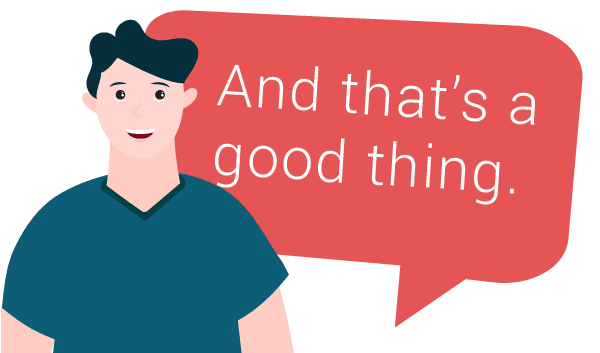
And this is the reason why our small intestines have become 1/3 shorter after we started cooking. And today, even if we want to it's close to impossible to thrive on raw food alone.
And don’t take this as a dieting prescription, please. But this is the reason why raw foodist can’t hold on to weight. They lose weight despite the number of calories eaten.
And the problem is that it messes with your brain. Reasoning abilities decline, especially in adolescents. And this makes getting out of this hell hole a lot more difficult.
Also, depending on how long have you been a raw vegan, returning to cooked food is usually painful and hard. Including a lot of bloating, indigestion and pain.
But this is not because other food is bad and it’s poisoning your body. But because your body has lost its ability to digest it.
Raw foodists suffer vastly from malnutrition. And this is partly from the lack of fat in the diet, partly from the overload on the digestive system with roughage, and the huge amount of waste produced. Excess pooing and peeing is not as great as we think, because we lose more than just the bad stuff - we lose minerals, vitamins, bacteria and so on.
So, please don’t try this in a desperate attempt to lose some weight. It will bring you a lot more problems than being overweight ever will.
Hmmm, last resort - Intermittent fasting?
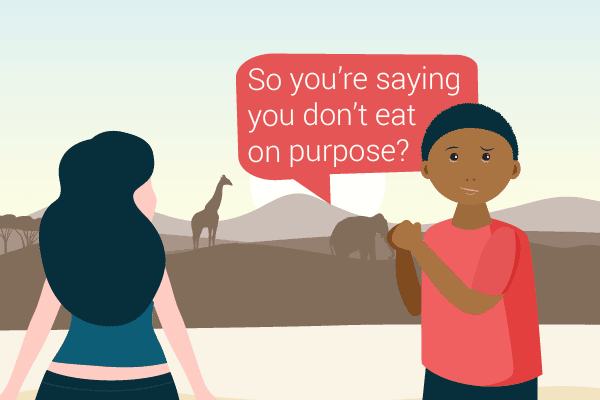
Intermittent fasting (IF) means that you eat in a certain period of time in the day and you don’t for the rest of the day. There are a lot of diets and protocols related to it. The idea is that when you’re not consuming food your body has the time to lower your insulin levels and repair itself without the burden of constant digestion.
Let’s say you normally eat in a 10-hour window, but you decide to change things a bit and shrink it to 8 hours. You eat dinner a little bit earlier. You don’t have any side effects. You don’t get hungry before bed. This is great! You’re in the clear. If you’re using intermittent fasting as a guideline, but if you get hungry you eat, or you change your schedule according to your needs - good for you!
Such modest change won’t produce the change you’re likely to want, though. Or at least not fast enough. And once you’ve started, you might want to do more. You shrink the window to 5 hours. Then you start 24 or 36-hour fast once a week, 3-day fasts, 10-day fasts...
And down the rabbit hole, you go.
It's important to address why you're fasting and how it makes you feel.
Are you fasting out of compulsion? Or because you feel better when you do?
How do you feel if you break the fast ahead of schedule?
How much discomfort are you willing to tolerate in order to complete your fast?
Do you experience a lot of hunger, mood swings, fatigue, brain fog and so on?
Some people get exhilarated and righteous. They start to believe that they don't need food. This is one of the precursors of anorexia.
Another thing is that because IF limits just when you eat, it’s usually used on top of a diet. And this multiplies the restrictiveness.
Fasting and resisting hunger are very stressful for our bodies when done to excess. We are learning to suppress, not address what our bodies are telling us. And this is a sure way to damage our relationship to our bodies and needs.
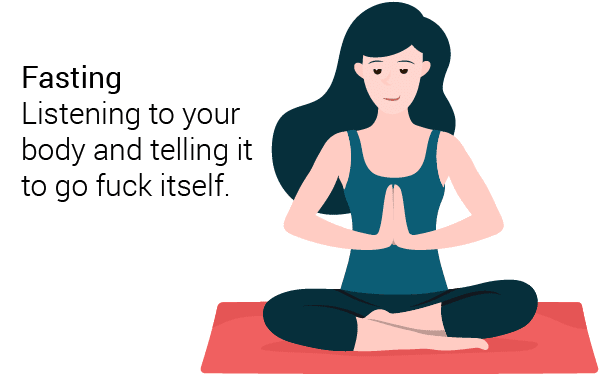
What are the diets missing?
Research flaws
Have you noticed that most diet books you pick up sound equally convincing? All claims are backed by science. How can that be?
It’s scientifically proven that keto is best. But also veganism. And low-fat. And low-carb. And Starch Solution. And Plant paradox.
This is insane.
It’s important to emphasize that nutrition is a fairly new science. The human body and the mind-body connection are very complex. And they are really difficult to study.
The current state of things is - no one knows a sustainable way to lose weight. Or if it’s even possible. Or necessary. Being fat is not a disease on its own.
Also, no one really knows if eating too much makes you fat or being fat makes you eat more.
And if someone is telling you they do - they are plainly lying to you. As you probably know at a great personal cost.
Dieting research is so limited and so flawed that it’s important to point out some of the most usual ways that we get fooled.
1. Short-term
Diet and lifestyle are things that are so multifaceted and have such long-term effects that it’s hard to study them in studies of 6 weeks. Which is the usual length of such interventions. And also, it’s a real stretch to claim that something that works for 6 weeks or 6 months, will work long-term or indefinitely.
2. People are notoriously bad to study
For your experiment to be successful, you need to make your intervention with all else being equal. But for people, it’s usually very difficult to change just one thing. If your study focuses on diet, a lot of the people will start to exercise more, to sleep more, to limit their drinking, to read more, maybe start meditating, or something else to keep the healthy habit ball rolling. Not accounting for these effects renders your research useless, because you can never know what intervention was making the difference.
3. Placebo effects
None of the diet studies conducted on humans accounts for the placebo effect. And yes, there is a placebo effect in every intervention. Not just in pills. This is another reason why short-term studies are problematic. Placebo effects wane with time. But 2-3 months or even a year may not be enough. But the placebo effect doesn’t last a lifetime for sure.
If you drink longevity tea spiked with poison. No matter how hard you believe that tea will lead you to a long and healthy life. IT WILL KILL YOU!
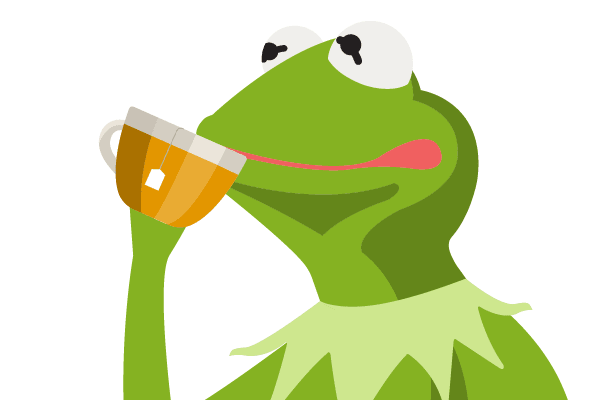
Placebo effects are most noticeable when there is a human intervention. The attitude of the scientist conducting the research can be reassuring or hostile. Which will inevitably have the effect on the results of the study.
Another thing is that people joining such studies are usually full of unfounded hope. They think that because this is a proper scientific study, then this time they will succeed. But usually after a while biology wins over enthusiasm.
And this type of placebo effect is almost impossible to study and get rid off. Even with clever statistics.
4. Too little subjects
A lot of the studies that explore diets are based on so few subjects that it’s really hard to take their conclusions seriously. For example, if a study has only 7 participants, it’s hard to control for gender, age, race, history of eating disorders and other factors that are definitely impacting the results.
5. No control group
It’s impossible to do a double-blind controlled study on diet. People are well aware if they are on a diet or not. So, as I mentioned before, placebo effects are hard to exclude.
6. Comparison of diets
Most of the studies “overcome” the control group problem by making a comparison between 2 or 3 diets. But they don’t give an answer to the question if dieting is good for you long-term.
7. No information on dropouts
Most studies do not disclose the number of the subjects that have not finished the trial. Though this is important. Because the diet or intervention might have been too much for those people. They might have suffered severe side effects, that don’t fit the goals of the study and so on.
8. Negative results don’t get published
Usually, papers proving that certain intervention is ineffective or not better than what it was compared to don’t get published. Which tilts the scales of our knowledge and robs us of the full picture.
9. Science deals with averages
The point in science is to see what is best for most people and to inform best practices. The problem is that none of us is the average person. This is why you have adjustable car seats for the car drivers. When auto companies made the seats for the average person, they fit absolutely no one. So they used this averaged information, as a starting point and then made the necessary adjustments available, so everyone can fit the seat for themselves.
It’s the same with eating. It’s good to have some guidelines, but we have to account for our personal deviations from the mean. This doesn’t make us bad or wrong. Humans are different. That’s all.
How you feel after eating a particular food or food group is much more informative for you than what some academic paper says you should feel.
10. Company funding
Because funding for science research is hard to get, a lot of trials are funded by companies. And those companies usually have an agenda, that consciously or unconsciously biases the results. When you know what the results should be, it's hard not to be influenced in your approach and assessment. Also, it the research doesn't fit the company's interests it usually gets buried.
11. Cherry picking
Up until now, we’ve discussed the flaws of the research itself. Now, cherry picking is the practice used by my many authors of choosing and citing just the research proving their hypothesis. Leaving out all evidence pointing out to the contrary.
This problem is severe because it requires you to go and check the research, how it was conducted, are the results significant and is there other research opposing the results. This is hard work. And should be unnecessary for people reading popular books. But it is… at least now.
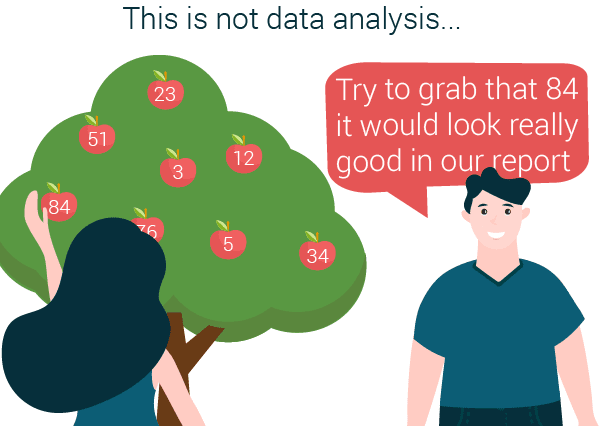
If you don’t want to go through a ton of research, my advice is - think about it. Can all this contradictory diets and dieticians be right? I think not.
12. Rats and Mice
Most of the studies cited in a lot of books and articles are based on rat or mice models. These studies are very valuable and usually, serve as a base for a human trial, which will prove if the effect is observable in humans or not. But sometimes it’s not ethical to replicate the studies with humans. So, we can’t go further with mice models.
I am not saying that these studies are useless. The problem is that in most books or media coverage this fact is not even mentioned. And the results are presented as the God honest truth without a hint of hesitation.
Bad reporting goes even further sometimes when authors don’t give direct links to the research and make it hard for you to find and check on your own. In these cases they feel free to add their judgment to the results of the study, reporting nonexistent benefits.
Emotions and restriction
All diets and prescriptions treat us like machines. It’s like we’re slightly different models of the same appliance. You should figure out the right buttons to push - which is the right diet for you. Et voila! A problem-free life and eternal happiness from then on.
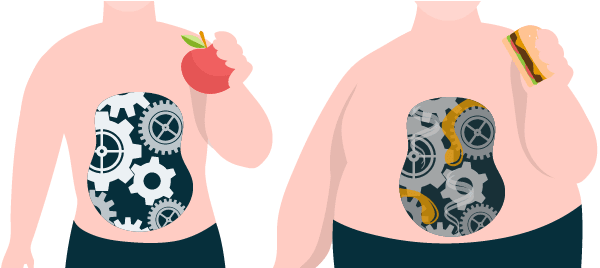
The problem is that our bodies are not calculators, as the calorie-counting paradigm would like us to believe. And we’re not just one dimensional - you limit your carbs, put your insulin under control and done!
We are as much biology as we are psychology. And our emotions and general predisposition toward life have real chemical effects on our bodies. They are part of your biology.
So it’s not realistic to say that you have no necessity for cake. So, making the claim that people survived without cake for 99% of human existence, and you don’t need it too, is a bit bonkers. The problem is that for 99% of human existence, there just wasn’t any cake. And saying that you don’t have the biological need for it is plain wrong. Because now we live in a world with cake.
Cake is a recognized way to celebrate birthdays and other occasions, so not eating it sometimes separates us from our loved ones. Also, cake is usually delicious and we want to eat it. So, when we don’t, we get feelings of deprivation. We get anxious. We use our willpower. All this creates stress in our bodies, which releases cortisol, which increases the release of the dreaded insulin, we were trying to avoid, when saying no to the cake.
So to the well and not-so-well-meaning diet book writers, I would say - I think you’ll find humans are a little bit more complicated than you think.
Habituation
Another problem with dieting is that it keeps some foods exciting. Having a list of bad forbidden foods makes us feel like naughty children. We want to break the rules. So, as a result, we end up eating foods that we don’t even like just to be our own masters.
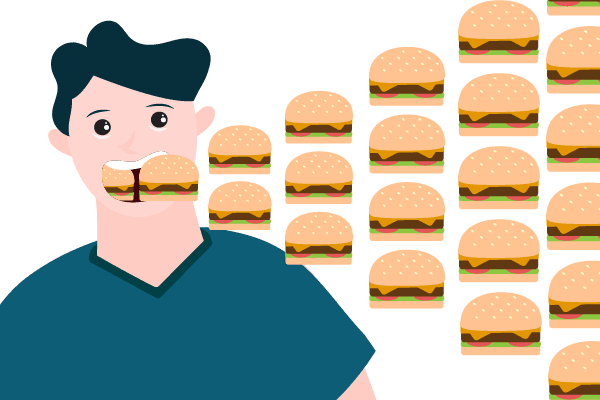
Usually, this is a binging episode, followed by deep regret and promises not be repeated ever again. But as long the restriction is there, the impulse to break the rules is also there.
Moreover, when we consume something regularly we get accustomed to it and we start to derive less pleasure from eating it. This is in our omnivore nature. This is the instinct that makes us eat a variety of foods, so we can obtain all the essential nutrients we need.
So with consuming all types of food regularly, we get habituated to them. We enjoy them. Vary them. And we don’t get cravings or such thrill and excitement from food.
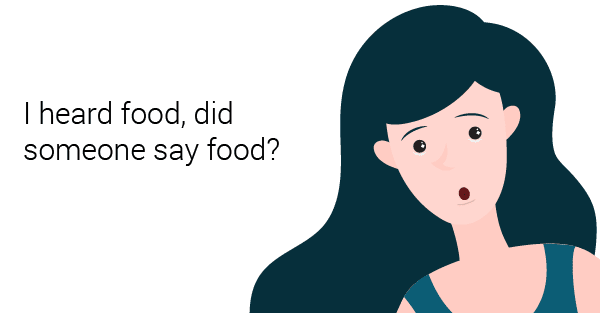
When we’re on a diet the habituation works in 2 ways against us. First, because of our limited food choices, we get habituated to what “we are allowed” that much faster. So, this “good food” starts to taste bland and unsatisfying fairly quickly. On the other hand, the foods we’re not eating are enticing because of our nack for rebellion and also our need for variety, pleasure, and satisfaction from our food.
So dieting doesn’t let us get habituated to foods like pizza, chocolate, cookies and so on. And we crave them intensely. We think that if we allowed ourselves those treats we wouldn’t be able to stop. This would be all we eat. But this is far from true. These are just foods and we get used to them as we get used to everything else. For most people, the restriction is what makes them enticing, not their addictive nature.
Pleasure
The most undermined part of eating in our diet mentality culture is pleasure.
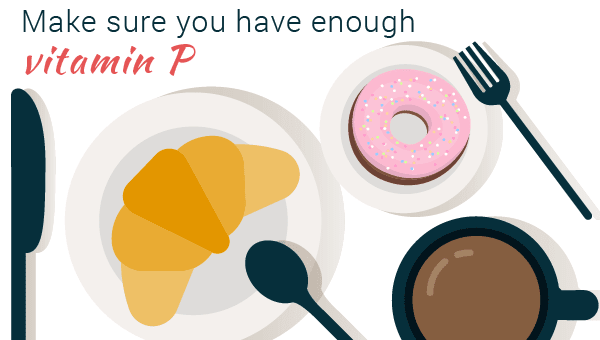
Food is something to battle with.
Food is a means to an end.
Food is medicine.
We eat for health. To lose weight. To build muscle. To control our cravings. To improve our performance. To keep our insulin steady. To feed our brain. And so on and so on.
But we don’t eat for pleasure anymore. If we do, we’re gluttons, we’re weak, we don’t have willpower, we’re stupid and don’t know what’s good for us.
But pleasure in eating is essential. Eating is evolutionarily wired in our biology to be pleasurable. Just as sex. Because eating, just as fornicating is essential for our survival and procreation.
There are multiple studies and articles exploring how pleasure is essential for benefiting from the nutritional contents of our food. That’s why the same ingredients don't have the same effects on our bodies when presented differently. You'll get a different response from your body if you eat a chicken leg with peas on the side compared to a blended chicken pea soup.
Anticipating, smelling and looking at a delicious meal makes us salivate more and produce more gastric juices. Which in turn helps us digest the food much better. Also, pleasurable food makes us satisfied and full for longer.
It is very erroneous that we think that the better the food the more we’ll eat. And this is the reason why a lot of the diet foods are bland, without spices and condiments. Also, dieters are encouraged to eat boring food, so they are not motivated to overeat.
This is so stupid.
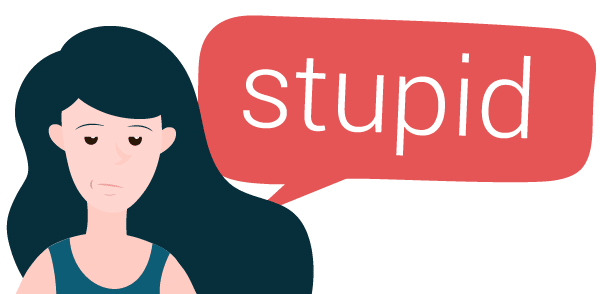
We’re wired for pleasure. And eating should be pleasurable most of the time. Otherwise, we feel unsatisfied and we start to crave all sorts of junk. This is due to two reasons. First, advertising has kindly made us associate pleasure with highly processed food. And second, it lights our pleasure centers like a Christmas tree. So, it's not a surprise that after a period of eating bland and horrible diet food, we tend to crave processed junk.
And please note I am saying diet food, not healthy food. It’s another big problem that we equate healthy eating to eating unappetizing boiled chicken breasts with overcooked cauliflower. And this is not the case at all. Healthy food can be delicious…
Eating should not be a punishment. But a joyous and pleasant experience. That is how we get the most out of it.
Digestion Issues
A lot of the types of diets or lifestyle changes focus on excluding the “bad” from your diet. It doesn’t really matter if it’s fat, carbs, gluten, fruit, cooked food, grains or something else or a combination of these things.
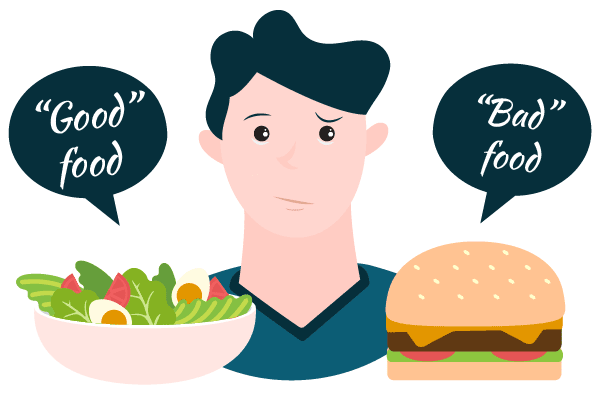
The problem is that digestion is like a muscle. When your legs are weak compared to your arms, you don’t stop training them all together. On the contrary, you focus on them and do more leg exercises.
The same is with digestion. The more you eat a type of food the better you digest it. So, the logic that excluding some foods improves your digestion is kinda bogus.
And the problem is that when we buy into this nonsense and we stop eating carbs. After a few months, our carb digesting abilities diminish. And when we do eat carbs we get bloated, gassy, sleepy, brain fogged and unhappy. And we get even more convinced about the evils of carb eating and we swear not to do that anymore… Ever!
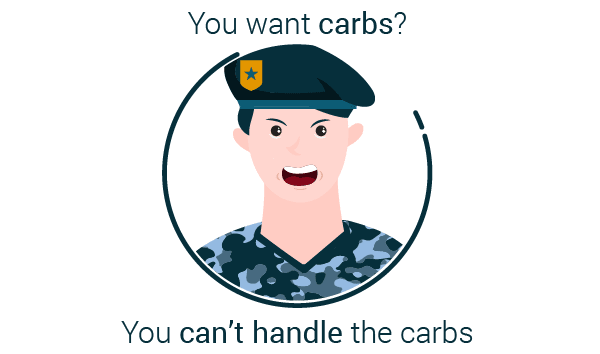
But we inevitably do… and the cycle continues.
Every vegetarian that has started to eat meat has experienced the same. Every raw foodist starting to eat cooked food again. Every healtoholic, eating something less than perfect also.
So, it’s not the food. Because this type of response can be elicited by practically everything we haven’t eaten for a long time. It’s the restriction.
Water
Every diet nowadays gives you the advice to drink plenty of water. This is to be properly hydrated. And mostly to control your out of whack appetite. Right?
A lot of the gurus tell you that we often mistake our thirst for hunger. And that’s why when you are hungry it’s best to drink a glass of water first, to see if your hunger wasn’t just thirst.
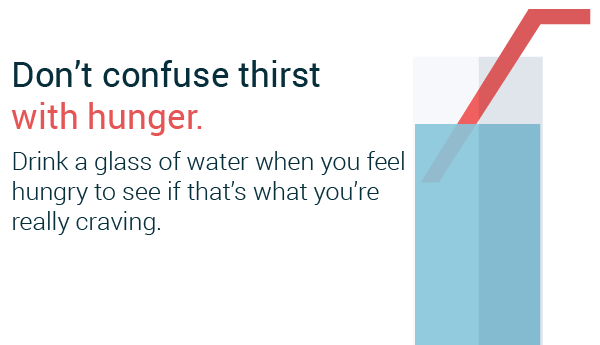
This is so messed up.
You’ve felt thirsty, right? You’ve felt hungry? And the feelings are different in my opinion.
This is another way for you to feel that you can’t understand your body on your own. That your body is tricking you. You need to hack it. And you have to know all the tricks in the book, so you don’t get fooled.
Let me tell you briefly why drinking lots of water is not so good for you.
First, we're the first generations to walk around with bottles of water in our hands all the time. Our ancestors never did. They got most of their water from food, and sometimes from drinking from natural springs.
Drinking the recommended 1/2 oz per pound of weight or the simpler recommendation of 8 glasses of water a day has no scientific backing. I have no idea how this got mainstream, but it’s bogus.
Also drinking more water than you need - which means drinking water without being thirsty, leads to a lot of unpleasant effects. First of all, you pee a lot. You’ve been lead to believe that this is good. That the clear color of your urine is fantastic. And that this is a sign that you’re properly hydrated.
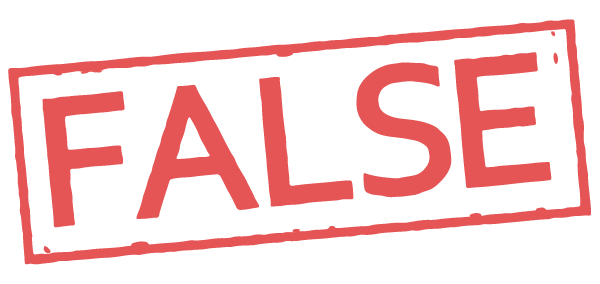
This is the sign that your kidneys are not able to catch up with your drinking. And the problem is that when peeing you’re expelling more than just water. You’re taking out nutrients that your body could have used.
Also, it’s uncomfortable. Peeing much more often than once in 3-4 hours is a sign that you’re overdoing the water thing.
One more serious consequence is called hyponatremia. Which means that the amount of salt in your intracellular fluid is too low. I hope you’ve noticed that your body fluids, like sweat and tears, are salty. And they should be. This is because salt is an electrolyte, it conducts the electric signals from your brain through your nervous system. And this is really really good.
When drinking regularly to excess, you water down your intracellular fluid. And the nervous systems processes begin to slow down. You might get ticks and twitches. Also, you might get cold. Really really cold. This is the surest way to lower your body temperature. To have really cold hands and feet. And to be looking for a blanket in the summer.
Especially women are told that having cold hands and feet is normal for our gender because our bodies focus on preserving our core body temperature. The last bit is true. The first isn’t.
It’s not normal to be freezing cold when everyone else is warm and toasty. This is a sign of hyponatremia and lowered metabolism.
Yes, you guessed it. This act of drinking way too much water is counterproductive. You think that it will help you lose weight. But it slows down your metabolism. Makes your body think that you’re freezing. And you start putting on fat easier than before.
Also, since the 80’s we know that water is not the best thing for rehydration. If a person is really dehydrated you can’t rehydrate them with plain water. They just won’t be able to digest it.
The way to properly rehydrate is with water with sugar and salt in it. This is to mimic the intracellular fluid composition, to make the water more digestible and to introduce electrolytes in the system.
So please, don’t drink water for the sake of drinking it, because it’s healthy or because heating a glass of ice water in your body burns “X” amount of calories. If your health is what you’re after drink when you’re thirsty. And if you start peeing too often or start feeling cold for no reason, please add some salt and sugar to your drink.
You might think at this point that sports drinks are a fantastic alternative! Just a second. Sport drink companies are in the business of making money and they sell you what you like, not what's best. We, humans, prefer pure sweetness to the mixture of sugar and salt. So, most sports drinks contain mostly sugar and just traces of some electrolytes, which is not what you need.
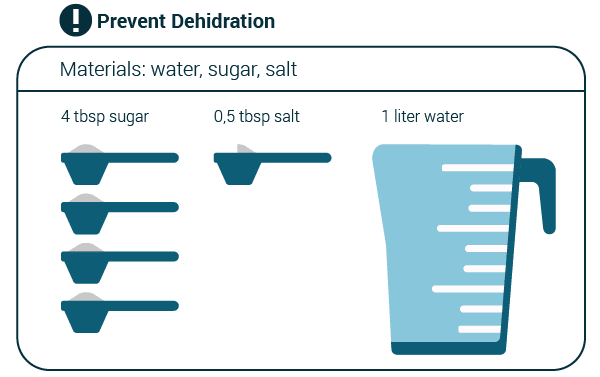
Some other factors that determine your weight
The darling people who tell us how to eat to lose weight usually have a simplistic view of human biology. And they propose that food is if not the only factor that determines our weight, at least the most relevant.
I’ll list here a few of other factors that play a role in your size and weight.
- Genetic factors. If your parents and grandparents are overweight, you have good chances of being like them. And this is not because you live in the same environment and share the same “bad” habits. Approximately 70% of the variance in obesity can be explained by genetics.
- If your mother was malnourished. There are post-war studies showing that women who were malnourished during pregnancy produce offspring prone to obesity. This is also true if the mother-to-be has severely dieted or is dieting during the pregnancy to keep her figure.
- If you are a second child and you have less than a 4-year difference with your older sibling. This is highly correlated to the above case. Usually, less than 4 years are not enough for the mother to replenish her nutritional reserves. So, the second child grows in an environment of scarcity. Which is also detrimental to the mother. And is one of the factors in developing osteoporosis.
- Your mother smoked when she was pregnant. Smoking while pregnant is correlated with a variety of issues for the child. And problems with weight is one of them.
- Your mother took antibiotics while she was pregnant. That early exposure to antibiotics can change the baby's microbiota profoundly and it might not be able to bounce back. Especially if it's bottle fed.
- You were delivered by Cesarian section. The baby gets most of his bacterial cultures by passing through the birth canal. And if the mother has a healthy microbiota, the baby has a really high chance of inheriting that. When the baby is delivered by Cesarean section it doesn't get these first microbial cultures from its mother but from the nurse's skin cells and the surrounding surfaces. And these cultures might not be the best start for a child.
- You took multi-purpose antibiotics at an early age or a couple of antibiotic courses in a row as an adult. Antibiotics profoundly change the balance in our guts. Antibiotics at an early age can tilt the scale for the worse for the rest of the child's life. And a few courses of antibiotics in a row will do that to an adult. This could have profound effects on the person's health and weight.
- You are or have been pregnant or are in puberty. Pregnancy as puberty are periods of huge hormonal changes. And it’s normal for a large proportion of people’s bodies to be changed profoundly by them.
- You are on the pill. The additional hormones you ingest with the pills usually changes your hormonal responses. So this might lead to changes in your weight. This also happens when you stop taking them.
- Environmental toxins. It has been proven that a lot of environmental toxins and molds have effects on our weight. Evidence of that is that not just people are getting heavier, but wild and laboratory animals too.
- Your brain chemistry. If you are prone to worrying, then you have drawn the short straw. You’re more likely to be stressed and overweight because your brain produces more glucocorticoids. They are the precursor to cortisol, which leads to higher insulin levels and higher weight.
- Stress. Even if you’re not an anxious person your circumstances might be such that you’re in a constant low or medium-stress environment. Which has the same effects as being anxious by nature.
- Too little sleep. Not having enough sleep, is inherently stressful for the body. It depletes our resources to face the challenges of life and makes us less capable to cope. This also makes cortisol wreck havoc in our bodies. And impairs the recovery processes in our bodies and memory. Not sleeping enough is also correlated with strong sugar cravings.
- Psychological reasons. Sometimes lack of fulfillment and meaning in our lives and the hunger for those things might manifest as physical hunger. The hunger for emotional connection, purpose, value, and food get a bit mixed up. So, especially when we’re disconnected from our bodies it’s difficult to differentiate between the hunger for meaning and the hunger for food.
- Hormones. I am not saying there’s something wrong with your hormones. Or that you need to fix them. But the hormonal responses of some people are correlated with higher weight. And this is totally ok! The same goes for the hormonal makeup of naturally thinner people. It's just that your hormones have a huge say in how much you weigh and they are not directly connected to food.
- Microbiota. As the human microbiome project shows us, there is a strong link between our microbiome and our health. And the composition of our microbiome is not something that we have total control over.
As you can see there is much more to weight than eating. And some of these factors are under our control, some partially, and some not at all.
Do you think that stressing over your weight and appearance does you much good and makes your life better and happier?
Consequences
Disconnect with your body
I have no idea how it came to this. But around food, we act like children, who need to be parented. We don’t trust ourselves. Our appetites. Our preferences. Our hunger. We think we don’t know. And that we can’t be trusted.
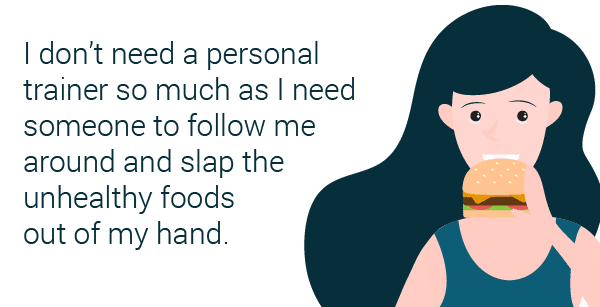
One reason for this is that we don’t look like airbrushed models and actors from TV. So we need to improve. If we want to look better we have to do better.
And the nightmare begins.
We start trusting “dieticians”, magazines, dieting blogs, TV personalities. Everyone who says they hold the answers and who has "achieved" the success we want. Everyone but ourselves.
We eat food we don’t like. We eat when we must, not when we’re hungry. We salivate while watching the foods we want, but don’t eat. We feel morally superior when we eat as little as possible and resist hunger for days.
And all these rules accomplish one goal and one goal only. Total disconnect with our bodies. After a few diets, we can’t tell if we’re hungry or not. What we’re hungry for gets mixed up with what we’re “supposed” to eat.
This perpetuates the problem because we’re no longer able to read and hear the signals our bodies are sending us.
We think rather than feel. We think we shouldn’t be hungry after eating a pasta salad, because of its volume. We rely on external cues to tell us if we’ve eaten enough. We consult the clock not our stomachs to see if it’s mealtime.
Do you see the problem here?
I am not saying that sometimes it isn’t smart to eat before you get hungry if you have a long day ahead of you and you won’t have an opportunity to eat later. But this is something to do once in a while. And we do it all the time.
We don't listen and we don't understand our needs.
How sad is that?
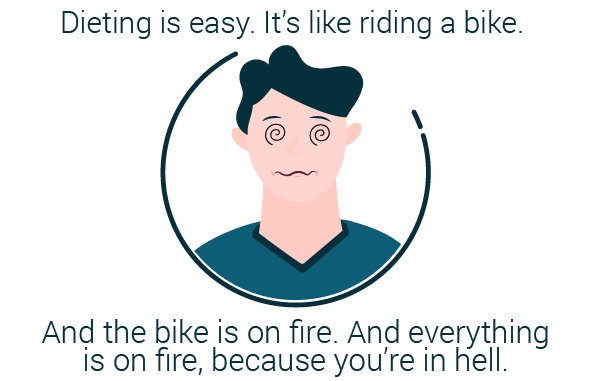
This is what dieting does to us. Makes us doubt our own body intelligence and trust someone else. But the only one who knows what you need is - YOU.
A side of guilt and shame with every meal
We’ve become wary of diets and terrified of eating.
I suppose you know someone who’s naturally thin. Have you gone for a meal together? If you have you might have noticed that even if you’ve ordered the same thing you’re not eating the same thing.
If you’ve ordered pizza, they are eating the pizza, enjoying the cheese and the crust, the taste of every bite. What are you eating? Mostly guilt, shame, and doubt? You are unable to taste and enjoy your food, because of all the emotions and feelings that are overwhelming you.
“I shouldn’t have ordered that! You stupid pig”
“Why didn’t I order the salad! I would have been better with the salad.”
“Is she/he judging me for eating pizza?”
“I don’t deserve pizza! Look at me! I have eaten my fair share of pizza, I can’t have it ever again.”
“I am so weak! I don’t have any willpower”
“It sure tastes good, but I need 4 hours of cardio to burn that off!”
“What would people think of me?”
I guess this internal dialogue sounds familiar if it’s not much harsher in your head.
For most people these days, regardless of weight, eating is a moral act. We have “rights” and “wrongs” and we punish ourselves harshly if we follow our desires.
The problem is that all that powerful emotions are not without effect. They hinder your digestion and actually make you gain more weight from what you’re eating.
Eating has become a really emotionally charged activity, which is to no one's benefit.
Body Dissatisfaction
The diet industry has convinced us that if we don’t have a perfect body it’s our fault. We didn’t try hard enough. So, we should be ashamed of ourselves. And we do.
We internalize those messages so deeply and we punish ourselves dearly.
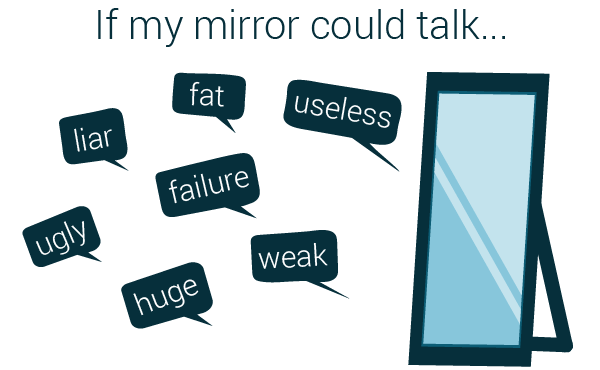
We believe that since we don’t have the perfect body we need to redeem ourselves for our transgressions. For being different. Never mind that only 5-10% have the blueprint to have the idealized bodies. And even if we lost the weight we will still have flaws that need fixing.
Body dissatisfaction and body dysmorphia are serious issues.
Most people hate their bodies, regardless of their weight.
This is not good.
Also the images we have in our heads about what is healthy, how we should look and how we should act, distort our perceptions. Big time.
When anorexics see other anorexics they see and say that they are too thin. But they see themselves as fat and disgusting!.
We all have this distorted view of reality. Maybe not to such a degree, but we do.
And this will not be remedied by another diet, gastric bypass, self-loathing, guilt or bashing. The only cure is self-acceptance and self-love.

Eating disorders
Eating disorders (EDs) are at an all-time high. It’s true that some eating disorders have a mental component. Like anorexia nervosa.
Anorexia is a horrible disease, which plagues mostly girls. The problem deepens because our society focuses so much on thinness and sick girls usually get a lot of compliments on their slenderness in the first and medium stages of their disease. Which makes it very hard to get out of the hole they are digging themselves into.
And the fear of becoming overweight is so perverse that anorexic girls are considered recovered when they reach 90% of their ideal weight. Not the full 100%, not 105%. Which I think is horrible. I don’t see the harm in 5-10 extra pound if they help you not slide back into old anorexic patterns.
I think that there could be and is more than one reason for the same condition. Of course, some of the cases of EDs are genetic. But I suspect most cases aren’t. And our environment doesn't help. Our dissatisfaction with our bodies is so pervasive that kids start feeling it as early as 8 years old. They fat shame each other. Most girls have dieted by the time they reach age 12. And dieting for adolescents is especially dangerous because their reasoning skills haven’t fully developed. And it has profound effects on their development and their adulthood.
The best predictor of eating disorders is if the person has dieted as a teenager. Most eating disorders start with a diet, or a health class at school that prompts teenagers to avoid sugar, or experimenting with veganism.
Teenagers who use fasting one day a week as a mean for weight control are 5 times more likely to become bulimic or get a binge eating disorder than girls that are just dieting.
The “success” of these interventions in terms of weight loss and the subsequent praise, attention, and compliments gets them hooked. And if you repeat these behaviors from an early age, overcoming them becomes that much more difficult.
A lot of people have disordered eating behaviors, if not full-blown eating disorder. Nowadays you can't go to the restaurant without hearing people bashing themselves for ordering something, or making excuses that it's just an exception. This is far from normal.
There is also the pervasive belief that if you’re overweight you can’t possibly have an eating disorder. So, a lot of people don't even get the proper help.
Most modern diets are restrictive in some ways and this usually results in binge eating. Repeated enough time this is the basis for binge-eating disorders. If you purge, you’re likely to end up on the bulimia spectrum.
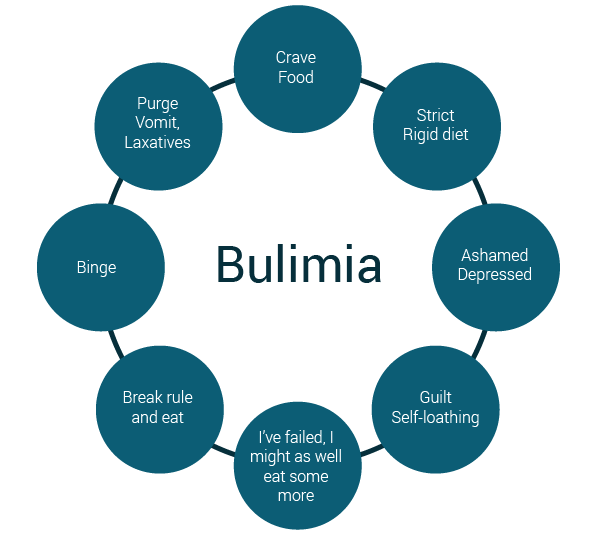
Also, the newest recognized eating disorder is orthorexia nervosa. For some, it sounds like a made up thing, but it’s not. I have suffered from this for a long long time. It usually affects health-conscious individuals, who make good efforts in eating healthfully.
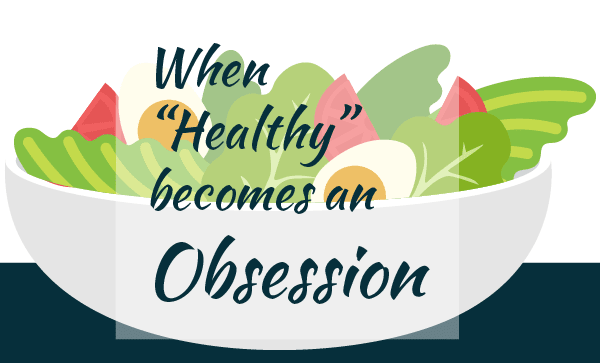
There is nothing wrong with eating mostly whole foods and taking care of yourself. The problem begins when things go too far. When you’re unable to go out with friends because you worry that the food won’t be prepared properly. You stop visiting your family because they don’t follow the same eating rules. You miss work trips, opportunities and leisure traveling, because of the fear that your food choices will be limited and suboptimal.
I am sorry to break it to you, but this is not health - this is a prison.
And it is long recognized that the greatest predictor of longevity and health are good strong relationships. When you ruin those in the name of clean eating… I am sorry, but YOU LOSE.
When I lose 10 pounds I will…
Dieting has made us put our lives on hold. When we think we’re fat, we feel unworthy of what we want. We feel less than. We feel ashamed.
How many times have you told yourself this:
- I’ll buy new jeans after I lose 10 pounds;
- No one can love me until I lose 20 pounds;
- I’ll wear a 2 piece swimsuit after I get a beach body;
- I can’t wear short skirts until I lose weight;
- I can’t go to the gym before I lose some weight. Everyone will mock me.
- I can’t go to the beach. NEVER.
- I can’t eat dessert before I reach my goal weight.
- I can’t be happy if I look like this.
- I can’t go dancing.
- I can’t get the job, I want until I lose weight.
- I can’t go bungee jumping or jump on a bouncy castle.
- They’ll turn me down for promotion, looking like this.
- I’m too fat to do/wear/act like I want to.
We feel less than and we feel that we have to conform first, be happy later.
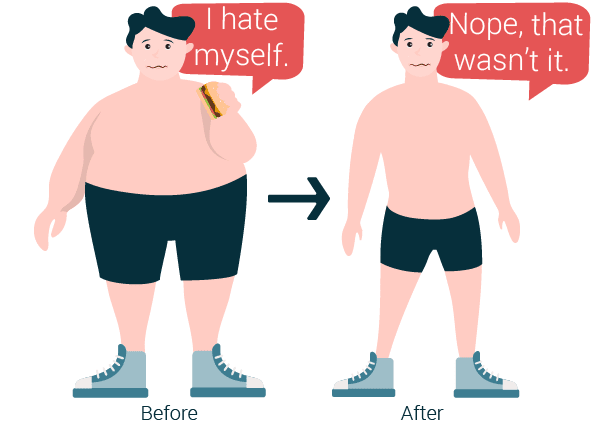
The problem is that it’s not how we look, that’s holding us back. It’s us. And we can start living the life we want and do the things we want now. Without losing any weight.
We can dare to be happy just the way we are.
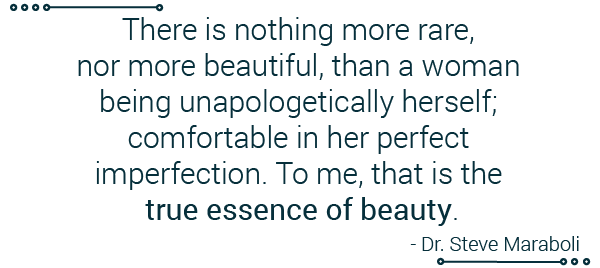
This applies to men as well!.
You’re a worthy wonderful human being just the way you are.
A note on intuitive eating
I want to briefly describe the practice that has helped me a lot in rebuilding my relationship with food.
Intuitive eating has a significant overlap with mindful eating, unrestricted eating, and flexible eating. So, if you prefer some of the other practices, please go ahead.
The main principles are to consult with your body to access if you're hungry or not. And also what you want to eat. Eat what feels right at the moment. And don't try to swap ice cream for sorbet if ice cream is what you really want.
When you start eating, eat at a pace that will allow you to taste your food, and note the flavors and the textures. Make effort to thoroughly enjoy your food.
When you reach half your portion, access how full are you? Do you need to eat more? And if yes, how much more do you need.
If you eat everything on your plate, access your fullness level again. You can go for seconds if you feel you need them.
Also, keep in mind that nothing is out of reach. So there's no need to eat as much as you can now because you don't know when you'll eat the same again. Try not to fall for the scarcity mentality here and eat just as much as you can really enjoy. Remember - you'll eat when you get hungry again, so no need to pile in too much food.
It sounds simple, but it's still difficult for me sometimes. Sometimes the chatter in my head about what's right doesn't let me hear what I really want. Also, I can't access my fullness levels correctly every time, so on ocasion, I overeat. And sometimes when I am really hungry I eat faster than normal.
The point is this, you don't need to be perfect. And I definitely am not. That's why it's a practice. I take it as it comes and do my best to follow the principles. Not because these are the rules now, but because I feel better that way. I am more relaxed. And I actually started to enjoy eating again.
If this makes sense to you and sounds like a good way to live your life. Give it a try.
If it doesn't - find something that works for you and will make you happy.
Conclusion
I am glad that you read so far.
Even if you’re fully entrenched in the diet mentality, I urge you - read a diet book that promotes the opposite of what you’re doing and start noticing the flaws of reasoning.
It’s not an accident that Weight Watchers and Jenny Craig have lifetime subscriptions.
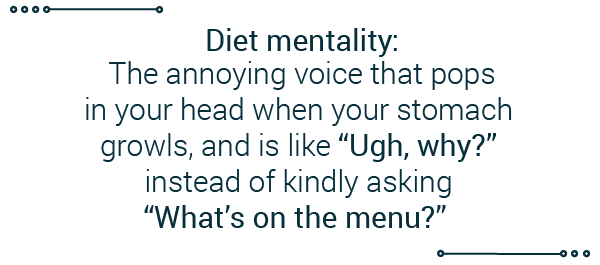
Please broaden your horizons. Don’t fall for your confirmation bias.
Thankfully there is now a study that shows that practicing body acceptance and trusting your hunger and appetites leads to better results than dieting. This is the beginning of the movement “Health at every size”. There are a lot of books and resources connected to this movement, which are valuable. They can help you begin to repair the relationship between you, your body and your hunger.
A lot of people think that if you accept your body then this will be to your detriment. You won’t care about your health and you wouldn't eat well. This couldn’t be further from the truth. Learning to love and accept yourself unconditionally is one of the best things you can do for yourself.
If you’re not convinced ask yourself who do you take better care of - someone you love or someone you loathe?
I think it’s time to stop the dieting madness, that lines rich people pockets and makes us miserable and ruins our self-esteem. We can learn to like and live in our bodies. Learn to hear and understand them. To be healthy and happy without guilt and deprivation.
Leave the “No pain, no gain” nonsense.
Learn to be kinder and more accepting of yourself.
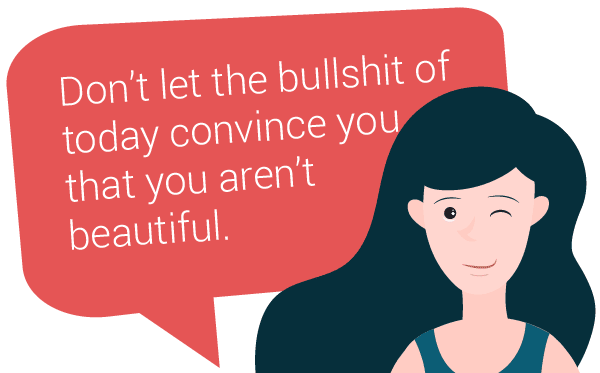
For you, who think that if you’re not dieting you’re letting yourself go, that you’re giving up. You’re not. Not dieting is not about giving up. It’s about moving on.

Dieting is a cruel game. And the only way to win is not to play.
Do you think that someday you’ll regret that you haven’t dieted more?
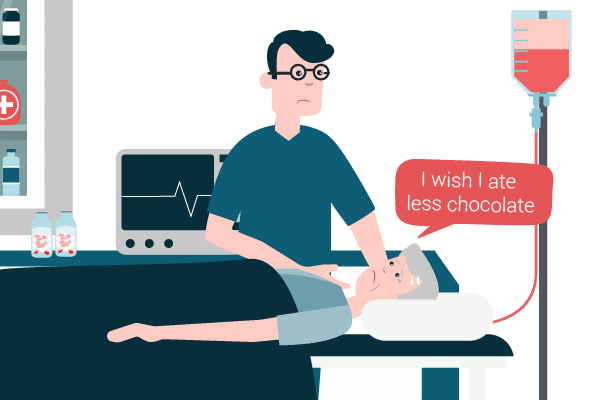
About RunRepeat
At RunRepeat, we help people to find the best shoes for their favorite sport - running, hiking, basketball, or indoor training. Our in-house testing allows us to publish the most objective shoe reviews out there.
We also do research and write in-depth articles about our favorite sports and health-related subjects. Check them out here.
* Feel free to use any content as long as you reference the original source. You can contact the author at vania@runrepeat.com for any requests or questions related to the content.
